#With the idea of servitude and fulfillment and abandonment
Explore tagged Tumblr posts
Text
...interesting.
In Chapter 1, you get flowers from Asgore.
In Chapter 2, you get chocolates from Undyne.
So, what kind of Valentine's day merchandise will we get in Chapter 3? A lovey-dovey card? A scented candle?
...saucy underwear...?
#rambling#deltarune#this is structured like a joke post but it's genuinely quite interesting#Seems like the theme of love is going to be explored quite deeply in this game#(and I don't mean Level Of ViolencE)#I mean. when you look at how much attention the game puts on the potential pairings between Kris/Susie/Ralsei/Noelle#And the whole Lightner/Darkner situation#With the idea of servitude and fulfillment and abandonment#And the sibling relationships between Kris and Asriel#And Noelle and Dess#It's... kinda hard to escape that conclusion#...this may become an essay later
17 notes
·
View notes
Text
I had an idea which I'm going to call 'A Colony of Cryptids', as a group of bats is called a colony.
Basically, Bruce is probably the only human member of the family.
Alfred is over of those beings well asks for the firstborn child in exchange for something, and the Wayne's asked him for two things, servitude until they died and help to improve Gotham. Of course, they managed to improve it before they'd died, so Alfred was free to leave, taking Bruce with him, but decided he liked it here, and stayed because of his own will. If he was supposed to return based on laws of his kind, then perhaps he found a way to discreetly pass the torch to Bruce, meaning he'll be part of the Wayne family until the Wayne Name is gone. He's the only one who knows about everyone who isn't human. Perhaps he's an eldritch entity, which is how he knows as much as he does, and how he can still reign in the others.
Dick is probably some kind of fae, probably a changeling. He found himself enjoying life as a supposed human child, and then his chosen parents died. He was supposed to return, he's not supposed to interfere in the human realm more than he already has, but he wants to take their killer down before he gets dragged back. He meets Bruce, and ends up imprinting on him maybe, and this man becomes the only reason his old kind haven't dragged him back. He wants to be a real person, but he also can't let go of his past.
Barbera is an entity whose entire being revolves around determination and confidence. From proving herself as Batgirl, to refusing to step down as Oracle, she's always there, persevering through everything. She's either a spirit (personification) of perseverance, akin to the Spirit of Gotham, or really could be anything.
Jason is an entity who's supposed to represent the innocence of childhood, perhaps he already died before, much much younger, and this was an attempt by the Powers That Be to give him another chance, perhaps they just keep returning him until he can live a fulfilling life. The Lazarus pit did two things, it both enhanced and suppressed what he represents, resulting in the torn up Jason we see to this day.
Tim is a god of knowledge who sought the only thing he hadn't yet experienced - humanity. This is why he's so forgetful about human needs, like sleep. This isn't necessarily erasing all his mental accomplishments though, as he locked away his memories, so he had to learn things again, but he had an accelerated capability to do so.
Damien might be an actual demon, or at least half or quarter, depending on LoA lore in this AU. Perhaps they're a special kind of demon that is more powerful when mixed with a human bloodline, or they're humans that go through a ritual that turns them half demon, maybe Damien was forced through it early.
Duke is probably some kind of angel even though he likely doesn't know himself, he just knows he has sight and light based powers. I don't know as much about him though.
Selina might be a cat goddess, or maybe some kind of yokai or something, perhaps a nekomata or bakaneko who was abandoned by her owner, hence why she takes care of so many kitties?
Cass seems like a good candidate to be a shadow creature.
Spoiler might be the only other normal person, but I'm not sure.
52 notes
·
View notes
Note
Baby Tal'ika: cuddles with Fox
☆*:.。.o(≧▽≦)o.。.:*☆
Let’s do this
---------------
The Jedi had, in fact, pulled away from Coruscant, and taken basically the entire GAR with them. Fox was pretty sure no one had expected that from them. He certainly hadn’t. The idea of the Jedi not being on Coruscant felt practically sacrilegious. But, here they were, on an uninhabited planet in the Inner Rim, building their own temple around a Force Nexus point, whatever that meant. Alderaan and Naboo had gone above and beyond to lend a hand to the Jedi, but everyone had been actually shocked at how self sufficient the Jedi actually were with their Service Corps. The AgriCorps alone were beasts, literally building the temple out of forcing literal trees and plants to grow in some strange way to form proper insulation and structure.
The temple finally had its living quarters, including the creche, built. For the past several months, Fox had been enjoying Tal’ika living in his hastily constructed home. Obi-Wan had been preoccupied with darting around the galaxy putting out fires, and while Fox, as a Commander, could have definitely been useful out there... He had a few months with Tal’ika in comparison to years spent with other people raising them.
Mace had assured him that he would still see them, and see them a lot. Jedi were partially rearranging their protocols regarding family separation, mainly because now that they were far removed from politics, there was a little more leeway in worries about outside influences. Jedi Initiates in the creche could have familial contact, instead of working up to contact once they were padawans. And, well, Fox was going to be working with the Jedi. A lot. Probably more than he should, but he was a workaholic, and it was probably a problem, but he couldn’t be bothered to care.
In any case, tomorrow they would start moving the little ones into the creche, and Fox was going to have his hands full getting all of the cadets and babies from Kamino settled in the ‘barracks’, because they were going to start getting shipped in in the next week. The logistics was going to be a nightmare. And Tal’ika was going to be gone, off in the creche with the other Jedi babies, and he was no longer going to be waking up with a warm weight in his bed that should be in their own damned bed. He wasn’t going to be making breakfast for two, wasn’t going to be helping them with their education modules, wasn’t going to be coordinating childcare with the crechemasters and other clones that had volunteered to help keep the Initiates in line until they could keep them all contained. He wasn’t going to be hounding them to make sure they brushed their teeth, or struggling over the braids he had learned to make, or having running conversations in a mix-up of Basic and Mando’a with a kid who still couldn’t reach the floor with their socked feet when they sat at the kitchen table. He wasn’t going to be carting them off to work, wasn’t going to be wrangling them to eat their vegetables, wasn’t going to be blatantly ignoring their abuse of the Force because it was the Jedi’s job to get after them for having fun, not him.
Tal’ika probably wouldn’t be moved in until the end of the week, but it was still hurting. The loss. He had really gotten attached, but he also had to be incredibly honest with himself. The constant stream of the chip being activated in his brain had fucked him up on several levels. He was trying his best. He really was. But memories of what he had been forced to forget were slowly and steadily filtering back in, and he wasn’t handling it well. He was keeping it together as best as he could, for Tal’ika, because he only had a few months with them before they went to people that didn’t need to see a mind healer on a daily basis for the foreseeable future, but Fox was also well aware that he was in no position to raise a child. He still had nightmares of control being ripped away, watching his body murder his own child with no way to stop it. An unwilling spectator to hell. A failure of a father.
No, he needed to work this shit out away from Tal’ika, because his kid was a goddamn empath and could tell sometimes he was terrified of them, and that just wasn’t healthy for them. Or him. He wanted to be selfish and raise them on his own, away from the Jedi and a life of monastic servitude, but they wanted it. They craved being a Jedi like a Quarren craved the sea. He couldn’t just make the decision for them, and he had to admit that the structure of being a Jedi was probably for the best for a child that had been genetically engineered to be slightly unhinged.
He wasn’t enough for them, and it kind of stung. Not enough a sting to not be happy that he was giving them the best possible chance in life while still getting to be their buir, but it stung. Obi-Wan was going to be getting back from mop-up operations on Toydaria tomorrow, and they were going to be spending time together with Cody, and Fox’s time alone with Tal’ika was coming to an end. Tal’ika, the perceptive little thing that they were, knew he was getting worked up. He’d cooked their favorite meal, a flatbread kind of dish piled high with trash like cheese and cured meats and sauce, and bullied them to go take a damned shower, because they had taken a tumble off a hill today and were utterly drenched in dirt and leaves, and a change of clothes had done the bare minimum to spare his little house. He was going to have to clean. Now, while they were washing off in the fresher, he was alone with his spiraling thoughts and dishes, up to his elbows in the water as he scrubbed the excess that had built up over the day.
Soft feet padded down the hallway, and he scowled at the bit of lunch that was stuck on the pot, refusing to budge under his scrubbing. Tiny hands wrapped around his waist, and Fox froze as a little head thunked right in the middle of his back, wet hair pressing into his shirt as Tal’ika ground their face into his back.
“What’s up?” He asked, and their arms tightened around him.
“You’re upset,” they mumbled, and Fox swallowed.
“You’d be pretty upset if you were scrubbing this pot.”
“Then let it soak,” they grumbled, and he dried his hands, peeled his arms off from around his waist as he turned around. Undettered, they smacked their face right into his gut and clung to his stomach.
Ah. It wasn’t the empathy. They were upset, too.
With a sigh, he bent down to pick them up and carry them into the living room, flopping down on the couch and nabbing the blanket thrown over the arm. Without another word, they curled up in his lap, and he lifted and maneuvered them around so he could wrap them in the blanket.
“Did you brush your hair?” He asked, already knowing the answer, because the brush was sitting on the end table where he left it last night.
“No,” they mumbled, sounding utterly miserable, and he shifted them around so they were between his thighs. The brush was gathered up, and he started to work through their damp hair.
“You know you’ll still see a lot of me,” he reminded them, and they let out a huff of air.
“I know.” They didn’t sound convinced.
“You won’t be able to get rid of me,” he promised, though that wasn’t strictly true. They would be able to get rid of him, very easily, because as soon as everyone got everything functioning, he’d be fulfilling his duties as Minister of Education, which meant that he was going to be busy. Extremely busy. At least he wasn’t going to be Senator. They had offered him the position and he had looked Cody dead in the eyes and informed him if they let him into the Senate chamber without the threat of decommissioning looming over his head, there were at least fifty Senators that weren’t going to be making it out alive.
Rizz was going to be Senator. Fox thought they were the superior choice, personally. The Senate wasn’t going to know what hit them. One look of disappointment from Rizz would leave a shiny in tears, so it was probably going to be very effective in the Senate.
But.... Even so.
Tal’ika was glaring at the wall, which was basically just their way of showing that they were sad, and he sighed, leaning forward to press his forehead to the back of their head.
“We agreed on this, remember?” He murmured, his hands stilling, and Tal’ika tugged the blanket a little tighter around their shoulders.
“I know,” they muttered, but they didn’t sound happy about it. Was this what it felt like to send off your kid to boarding school?
“C’mere,” he said, deeming their hair appropriately brushed, and shifted them around so they were sitting more firmly against him. Tal’ika curled into his warmth, huffy and upset, and he leaned over to flick on their favorite holofilm.
“I think we can ignore your bedtime tonight. Obi-Wan isn’t here to get mad, is he?” He murmured, and Tal’ika snorted before wriggling around so they could watch the irritating holofilm he had memorized at this point.
“Obi-Wan doesn’t get mad. He gets disappointed,” they mumbled, and he snorted as he wrapped them up tight with as much love as he could put into his embrace.
“That he does,” he agreed smoothly. “That he does.”
Tal’ika’s attention flicked back to the holofilm, and Fox resigned himself to dramatic collapses on fainting couches and high end Core accents and ridiculous hairdos and pointless gestures to offset the jewelry dripping from their fingers from actresses having the time of their lives being as dramatic as they could. Why they loved these weird glam murder mysteries was beyond him, but at least it wasn’t a musical.
Tal’ika mouthed along to the lines they had memorized, and slowly and steadily, they started to relax in his grip. By the time they got to the torrid and helpless kiss in the rain that Fox knew for a fact was ruining the fur stole and silks the titular actress was wrapped in, they were a useless lump in his lap, and his mind was drifting back to the dishes abandoned in the sink. He still needed to finish them, but...
Something wet and slimy hit his neck, and his eyes locked on the wall as he realized they were definitely asleep and definitely drooling on him.
Well. Maybe a little longer. He knew as well as any clone that if he blinked, they’d be too big to do this again.
Just a little longer.
13 notes
·
View notes
Text
I've fallen asleep twice and opened the 'make a post' editor and immediately forgot what I was going to say three times so I'm gonna get this out before the adhd wins tonight.
So I'm dming a Wildmount campaign out of the Explorer's Guide to Wildmount. I've got two ocean gals who are about to complete the Tide of Retribution adventure offered in the book and they're wanting to continue further with these characters. So I'm reading about the Menagerie Coast and it's different locations trying to come up with something that would be fulfilling for these characters and fit with their backstories. My eye kept getting drawn to the Ruins of Sepesca:
In the centuries that followed the Calamity, the Ki'Nau people established Sepesca, meaning "Nature's End," as their holiest of burial temples, built over a lush grove where the blood of the Wild Mother is said to have spilled before the Divergence. Every Ki'Nau priest and king that passed was interred within Sepesca's massive stone structure.
An ancient feud between the goblinkin of the Lushgut Forest and the Ki'Nau came to a head a few centuries ago, when the goblins stormed the region and desecrated the Wild Mother's temple. The Ki'Nau protectors fled from the worshipers of Gruumsh, and the abandoned holy site fell into ruin. Vengeful spirits and gnarled monstrosities are said to stalk its sunken halls, guarding the seeds of darkness left by the Ruiner's faithful.
A few descendants of the Ki'Nau across the Menagerie Coast still seek the means to cleanse this holy location and finally bring peace to the forgotten line of kings
The Ki'Nau rose to power after allying themselves with Uk'otoa. This sect of Ki'Nau-from my understanding (adhd brain not working) - either never joined their brethren in servitude to Uk'otoa and always served the Wildmother post Calamity or broke free of Uk'atoa's influence to follow the Wildmother in this place of bounty and beauty.
Either way, it sounds like Melora and Uk'atoa have a small rivalry about followers that goes way back.
I also find it interesting that there are three other locations of burial across Wildemount built in service to the Wildmother, regarded as holy places of the Wildmother. And that one of those locations is in need of cleansing against ???? and the other was under attack for decades by some kind of mutated and dangerous unnatural creature, and the other is so isolated they had no idea what was happening at the other locations.
I dont know what it all means but it has set up a juicy plot for my players (I hope) since one of them is a cleric of the Wildmother and also set my conspiracy brain awhirling with regards to the three families of the Wildmother
19 notes
·
View notes
Text
ROTG Headcanon: Jack Frost and Frosty the Snowman
One day, during winter vacation, Jack Frost was entertaining a group of young children. Ever since he became a guardian he discovered that he could do so much more with his magical abilities.
Jack had thought of a brilliant idea. You see, the guardian had a very busy schedule due to all of the responsibilities his newly established position gave him. With the wave of his wooden staff, a pile of snow rapidly swirled and took shape into a form about as big as a child. Impressed with himself and his task completed, he flew off onto his next designation. That was the birth of Frosty the snowman.
The snow creature only knew one thing, and that was to fulfill his mission to bring joy. Frosty would talk and sing Christmas carols (despite not having a mouth) to the children, which at first impressed them, but ultimately they grew bored of him. Abandoned and lonely, he did not know what to do and eventually the winter season melted away, bringing the poor snowman along with it.
When the next winter came, Frosty was shocked that he came back to life. He figured that when his creator, Jack Frost, brought along winter he accidentally recreated him in the process. With his second chance at life, the snowman went full on deviant. He made an oath to himself to no longer continue his life full of servitude. He will be freed.
It took him many years to perfect his plan, but eventually the snow creature tasted success. During the hotter seasons, he would use his powerful twig legs to run away to colder parts of the world. He also broadened his singing talents to more than just Christmas carols.
Nowadays, Frosty uses his fee time to plot of ways to rival against Jack. They’re just can’t be two “Frosts”.
#headcanon#jack frost#rise of the guardians#rotg#rotg jack frost#rotg matters#frosty the snowman#theory#guardian of fun#guardians of childhood
29 notes
·
View notes
Text
ISLAM 101: WORSHIPPING: Part 6
How appropriate is it to say, "Allah will forgive" and not to worship?
Form of Worshipping
No being in the universe was created without any purpose; no living being was left without a guide. Allah, who does not leave ants without a prince, bees without a queen, fish, and birds without a guide, will definitely not leave human beings without prophets. Human beings can find Allah by looking at the incidents taking place in the universe and using their minds but they cannot know the purpose of their creation, where they come from and where they are going to and the forms of worshipping without prophets. Therefore, they do not perform worshipping randomly or without a system but based on a system and rules that they learn from their prophets; they present their respect and worship to God with awe and reverence.
Worshipping means belief in Allah and knowledge about His divine personality, the arrangement, and formulation of the things that need to be done with the love and admiration coming from this knowledge through the indication and guidance of God Almighty in accordance with His orders. That is, it is necessary to act and worship as it is required under the guidance of the Lord's clear verses and in the light of the lights emitted by the Prophet (pbuh) so as not to do anything wrong or inappropriate.
What is essential in man's relationship with his Lord are meaning, essence and spirit. However, what conveys them are words, forms, and molds. Therefore, it is necessary to pay attention to those words and molds. Those forms should convey the essential meanings. Therefore, it cannot be said that molds and forms have no meaning.
It is necessary to be balanced, moderate and to act in accordance with the criteria imposed by Allah while worshipping Him along with intention. The Messenger of Allah said,
"There are so many people standing while performing prayers that what they earn by it is nothing but tiredness; there are so many people who perform fasting that what they earn by it is nothing but hunger and thirst."
That is, the heart needs to turn to Allah. Zakah or sadaqah given without thinking of Him is nothing but wasting, and as the Quran puts it, becoming friends with Satan. To enjoin what is good and to forbid what is evil without having Him as a purpose in one's mind means to do dialectic and to deceive people by being engaged in demagoguery. Jihad without having Him as a purpose means to show off and wasting wealth and time. That is, the purpose of the spirit of worshipping needs to be the Creator; the servant needs to turn toward the Creator and worship Him.
In Islam, the scope of worshipping is wide. In Islam, worshipping does not consist of performing prayers and dhikr only. Every deed that is done in order to attain the consent of the Lord and to fulfill His orders is regarded as worshipping. For instance, a person can transform eating and drink into worshipping as follows: If a person intends to eat, drink and travel by finding it sufficient to eat halal food and drink halal beverages, avoiding haram and fulfilling the orders of Allah, his deeds will be regarded as worship. A person who eats and drinks with this intention and becomes strong becomes the addressee of the following hadith of the Prophet (pbuh):
"A strong (due to worshipping properly) believer is better than a weak believer and he is more beloved in the eye of Allah." (Muslim, Qadar, 34; Ibn Majah, Muqaddima, 10; Ahmad Ibn Hanbal, Musnad, 2:366)
When the deeds that the soul likes and takes pleasure from are done with such sincere intentions, they are regarded as worshipping and become means of getting thawabs (rewards). The servant takes pleasure from what he does and feels happy but he approaches Allah with every deed that he does because his intention is to attain the consent of Allah. Acting upon this fact, the fiqh scholars say, "A righteous intention transforms habitual deeds into worshipping."
Worshipping is classified as follows based on will, determination, intention, and sincerity:
a. Worshipping performed with the desire of Paradise.
b. Worshipping performed due to the fear of Hell.
c.Worshipping performed with the feeling of awe, fear of Allah and love.
d. Worshipping performed as a necessity of the relationship of the Lord and the slave, the Creator and the creature.
No matter how it is performed, worshipping (servitude) is the color of man's honor and the greatest rank granted to him. There is no rank and position higher than worshipping (servitude).
The Privilege of the Religion of Islam in Worshipping
According to some religions, worshipping means to leave all of the pleasures of the world aside and live in seclusion (like the life of monks and nuns living in a monastery). In another religion, worshipping can be performed only in some special places of their temples. According to some other religions, worshipping can be performed only under the leadership of some clergymen. The people cannot worship alone and in the congregation without the guidance of the clergymen.
In Islam, worshipping is free from intermediaries between Allah and His slaves. Man can apply to his Lord directly. In Islam, the clergy are not intermediaries between Allah and His slaves; the belief that worshipping can be accepted only through the mediation of the clergy only does not exist in Islam. In the eye of Allah, scholars, the clergy and ordinary people are equal in terms of worshipping. Superiority is based on taqwa (fear of Allah).
Islam has freed worshipping from the hands of the intermediaries and from the obligation of being performed in certain places. Every place, whether it is a mosque, a ship in the middle of the sea or a house, is suitable for worshipping as long as they are clean. Man can contact Allah by worshipping anywhere. The Messenger of Allah stated the following:
"The earth was made a mosque and a cleaner for me." (Bukhari, Tayammum, 1; Muslim, Masajid, 3)
That is, a person can perform prayers anywhere and he can use the earth (soil) to make tayammum instead of wudu and ghusl when there is no water.
The Relationship between Belief and Deeds
The principles that need to be believed in Islam do not consist of some abstract ideas only. The principles that need to be believed in Islam are some vital values that need to be done, though, believed, internalized and used in order to reach Allah with submission. These vital values become deepened by meditation and dhikr, are fed by worshipping; deeds and manners are also included in this framework so that individual and human thoughts will not affect them. Thus, a believer is in a relationship with the circle of belief all the time and he turns around the main axis of belief.
According to Ahl as-Sunnah, worshipping is not a part of belief. Deeds are not a part of belief. This principle is a general decree. That is, if a man does not do any deeds and does not worship at all, he will not exit belief. However, it is necessary for him not to deny any worshipping and accept that all kinds of worshipping are true.
As it is seen, there is a difference between believing and doing. However, this is the last boundary. In fact, there is a close relationship between belief and deeds. A person can be treated as a Muslim based on his worshipping only. As it is known, the application of some decrees among the Muslims who live in a community is based on the lifestyles of individuals since the religion decides based on outward appearance. A person who does not show any signs of being a Muslim will definitely not be treated as a Muslim. Besides, the real benefit of worshipping is to protect and improve the belief that exists. For, belief consists of proclaiming Islam through the tongue and confirming it through the heart. It is a source of infinite power and strength. However, it is necessary to strengthen and support belief with deeds in order to obtain the fruits and results that are desired. Therefore, the following statement of some people means nothing but demolishing the signs and principles of the religion: "The cleanliness of the heart and intentions are important in religion. Worshipping like prayers and fasting are not so important; there is no harm in abandoning them." For, if this idea is accepted, any denier can claim that he is a distinguished believer.
Besides, though some people who lived in this age and who vulgarized the issue said, "My heart is clean and I believe in Allah" without worshipping, everybody saw that they fell into Hell. Yes, belief needs to be strengthened by prayers, hajj, jihad and other types of worshipping.
Only worshipping can transform decrees related to creed and belief into faculties by strengthening and maintaining them. Yes, if decrees related to belief, which are involved with conscience and mind, are not trained and strengthened by worshipping, which consists of fulfilling Allah's orders and keeping away from what He prohibits, its results and effects will be weak. The current situation of the Islamic world is evidence of it.
It is necessary for a believer to strengthen his belief with deeds sooner or later.
Islam has two aspects: belief and deeds. They are indispensable parts of Islam. Belief, or creed as it is mentioned in the Islamic literature, means to believe in all of the things in the system of Islam like Allah, Hz. Muhammad (pbuh), the Quran and the hereafter in a way that excludes the opposite possibilities.
As for deeds, or as the Quran puts it "amal salih (righteous deeds)", that is, complete, flawless, impeccable deeds, it is the second important element of Islam after belief. For instance, worshipping is an indispensable part of it.
Since man cannot change the road opened by wisdom, he needs to fulfill this very difficult and holy duty truly to deserve Paradise. In other words, the only way to deserve Paradise is worshipping and being a slave of Allah. For, worshipping makes man pure and liable for Paradise.
Deeds of worshipping are in a way like the blockage of the issues related to creed and in another like faculties that improve them. For, if worshipping is not performed and if religion is kept in the conscience only by acting upon a common view today, deviation and destruction - God forbid - and consequently losing the worldly and otherworldly life will be inevitable. Yes, man can be protected from various deviations and his belief can be maintained only through worshipping.
Man can believe in Allah as a result of scientific research but it will be a theoretical belief. It can be transformed into real belief and elevated to the desired level only through worshipping. From this point of view, it can be said that it is always possible for a person who has not made worshipping a part of his nature and who has not deepened in it to deviate and go astray. Acting upon this fact, we can say that those who say, "I believe in Allah but I drink alcohol or I cannot perform prayers" lack one of the bonds that protect them. Yes, if those people are sincere in their words, they need to support their belief with deeds and be loyal slaves at the door of God Almighty with their deeds of worshipping so that they will be real believers.
Consequently, it can be said that worshipping is necessary for belief to remain fresh in the hearts and not to wither. Belief can remain new without withering only through worshipping. Otherwise, it is unknown whether the belief of a person who does not worship can last until he dies.
#allah#god#islam#muslim#revert#reverthelp#reverthelp team#convert#new revert#new muslim#new convert#welcome to islam#how to convert islam#prophet#muhammad#quran#sunnah#hadith#dua#pray#prayer#salah#religion
5 notes
·
View notes
Photo
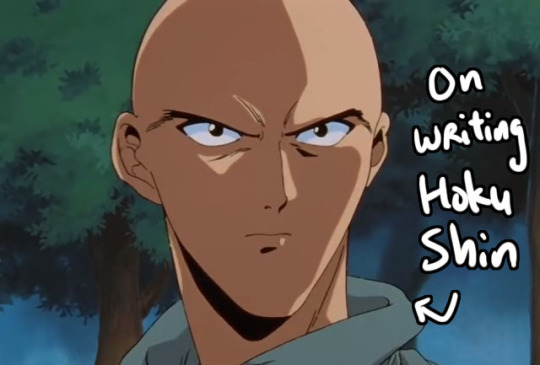
On writing Hokushin
(unrelated: WOW I just realized I can do headings in tumblr! WOw!!!)
I’m on a roll avoiding other work I should be doing lolll! Lately I’ve been super fortunate to have some great conversations with multiple lovely people about characterization of Hokushin. To probably no one’s surprise, I already think an embarrassingly lot about this and try to convey it in my fanworks, but I actually haven’t really sat down and articulated in depth. Shocking, I know. So here are some cleaned up/slightly more coherently organized version of thoughts!
Below the cut I basically ramble for a long time about understanding Hokushin's character with cultural/historical background and his relationship with Yusuke (and by extension Raizen). And some misc other stuff. I tried to break it out by topic, but a lot of it overlaps. One thing I don't really get into here is specific aspects of Mahayana (Zen) Buddhism, but it has an important underlying relationship with a lot of what l talk about below, and forms a significant part of Raizen and therefore Hokushin's narrative, how their characters are portrayed and framed, aaaand this is already really long.
With all that in mind, this is one person’s interpretation! I’m no expert, I mostly just read a lot of stuff when I get obsessed with it (usually for storytelling/comics research, and then forget everything soon after lol). In any case, it'd be boring if my ideas on Hokushin were the only ones that exist, and the point of fanworks is to create for personal enjoyment/fulfillment, so please make of it what you will! All I hope is that this was at least somewhat interesting/informative and helps give people more material and more love for Hokushin =D
The loyal retainer archetype
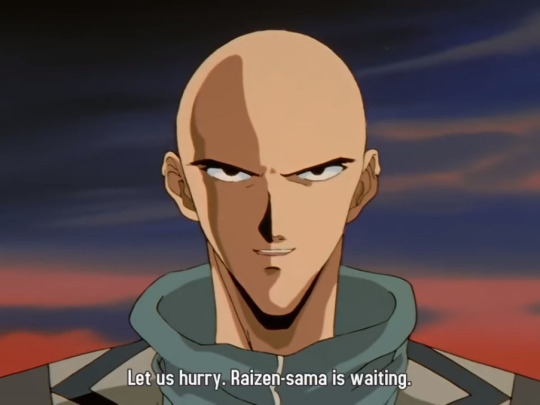
Hokushin's character is very strongly tied to the perceived classic Japanese archetype of the loyal servant/retainer and samurai (bushi/warrior class) ideals. They come with a very distinct paradigm and set of principles. Here’s a simplified summary.
Purpose, honour and thereby happiness comes from selfless loyalty and servitude. The fulfillment of your existence is to serve the will of your master.
The ideal/collective whole is prioritized above an (your) individual existence. There is a greater goal that you are merely one small aspect of, and you may not even expect to understand it.
Death is not necessarily perceived as a worst-case scenario, and can be viewed as the most honourable alternative to violating your own or someone else's principles, particularly that of your master. And in some cases, it may even not be an alternative. Death is not an end, but a means to an end usually to support the beliefs held in the previous two points.
We can reference the 8 virtues of bushido - the way of the warrior, sometimes called the samurai code. Now, bear in mind nobody necessarily went around going “I’m a samurai, and this is the code I follow.” This is a list formalized in the late 19th century by writer Nitobe Inazo to explain a concept of bushido and Japanese culture for a Western audience, and then it basically got absorbed back into Japan. Thus, bushido is a pretty heavily romanticized thing, and... anyway that’s beyond the scope of this post lol. The virtues are:
Righteousness (also rendered rectitude, justice)
Courage
Benevolence/mercy
Politeness
Honesty/sincerity
Honour
Duty/Loyalty
Character/self-control
BASICALLY A HOKUSHIN RECIPE, AMIRITE?? There are also particular aesthetic sensibilities to the execution of this archetype partly based on how Japanese history and culture evolved. Bearing and sensitivity matters, more is said in what is not said, there’s stoicism and elegance and refinement and poetry etc. Mono no aware and transience of life and all that stuff.
Essentially, even if such a character disagrees fundamentally with their master's reasoning, it's not unusual for a "true" servant to still abandon their family or their lovers and follow or even precede their master to death in order to uphold their master’s principles.
In the series, Hokushin says that he doesn't understand the king's reasons for his self-imposed abstinence, but that he still supports the king’s will. Later in the arc, he demonstrates the truth of his statement when he obviously doesn't agree with Yusuke's outrageous tactics regarding the future of their kingdom and the entire Demon World, but upholds it regardless. (As I noted in One and a Half Revolutions, the most "disobedient” Hokushin gets is when he plots strategy with the other monks for what they should do if they end up fighting each other during the tournament, and Yusuke is like YO KNOCK IT OFF NO THROWING FIGHTS. AND ESPECIALLY NOT TO MAKE ME EMPEROR. And Hokushin’s like, well you said you’re not our king anymore, so we don’t have to follow you and can do as we wish. And what we wish to do is make you Emperor. So what’s your issue. And Yusuke is like THAT’S NOT WHAT I MEANT)
This archetype is also NOTORIOUS for assuming a huge burden of responsibility and/or shame on behalf of their master, often in secret, for maximum service/honour value (and narrative/dramatic impact). The legendary Ako incident (the 47 ronin) is a famous historical example.
This intense commitment can be tricky to depict because you have to finely balance outward stoicism and emotional resonance, and you also want to temper things to make a character more nuanced and not just a flat stereotype - e.g., a "you say jump, I jump" personality or have readers going "omg why is this character so spineless/stupid", ridiculous levels of melodrama, etc. You still want people to be able to empathize with the character and to really feel for them when they make decisions that may otherwise seem extreme or incomprehensible. (Although in many ways there's an Eastern/Western philosophical difference in the perception and understanding of this. A simple modern example that comes to mind is in Pacific Rim, when Raleigh asks Mako why she's so obedient to Pentecost and she replies (paraphrased from memory), "It's not obedience. It's respect.")
The Hokushin decision-making flowchart
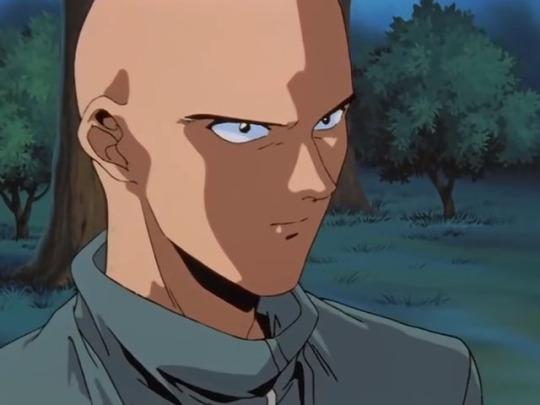
I use this very rough mental outline as a general guide if I’m struggling to decide whether or not Hokushin would do something significant. Bearing in mind interesting opportunities are usually not black and white, so “yes” and “no” below are usually more like, “yeah pretty much...” or “no, kinda not...” lol
Is it in accordance with his values? * If yes: go for it. * If no:
Is it in accordance with the will/principles of his master (Raizen, Yusuke, or whomever he’s committed to serve)? * If yes, go for it. * If no:
Does it ultimately aid the endgoals/ideals of his master? * If no: forget it. * If yes:
Can any negative consequences be minimized to affecting Hokushin only or mostly (e.g., punishment or humiliation or capture or whatever) with little to no long-term effects for his master? * If yes: DO IT!!! * If no: FIGURE SOMETHING OUT TO MAKE THIS ANSWER YES!!!!
Situations of deceit must be handled carefully, especially as honour is a major element of this archetype. The above flowchart can sometimes help... That said, deceit can be particularly challenging to contrive within the master and servant relationship. While we don't see Raizen and Hokushin directly interacting in the series, there's extremely strong implied trust between them. We can see this from how they speak of each other to other characters, namely Yusuke. We can also extrapolate aspects of their relationship from how Yusuke and Hokushin interact, because it's repeatedly emphasized that Yusuke and Raizen are quite similar fundamentally, and Hokushin clearly assumes Yusuke will succeed Raizen.
Yusuke and Hokushin: the initial meeting
In their first meeting, Yusuke’s absolutely furious at being misled by Hokushin. The beautiful thing about the setup of this deceit is how it:
Allows us to see the values and personalities of both characters.
Enables Yusuke and Hokushin to evaluate each other.
Establishes and enhances the dynamics of their relationship.
The above lies in Yusuke’s reaction to a particular piece of information being withheld, and how Hokushin handles the situation after being called out. Remember:
Lying is generally not in line with the loyal retainer/Hokushin’s values.
Honesty and straightforwardness are also big for Yusuke.
With point 1, Hokushin deceives not by lying but by leaving out significant information: that he - and potentially by implication, some % of Raizen’s followers - still eats humans so that they don’t get weak and die. His rationale for doing so is that Yusuke, being formerly human and having lots of people close to him who are human, would have a hard time getting past that fact if he learned this on their first meeting, and would not be willing to follow them to the Demon World. Totally reasonable assumption. If Yusuke doesn’t know, he’s more likely to be receptive to joining their kingdom, which protects the interests of his king and the safety of his people. This passes our flowchart with flying colours. (I elaborate on this a bit more in A Song on All Sides.)
However, when Yusuke figures out what happened, point 2 makes this especially problematic for their relationship. We know Yusuke is all about gut feelings and first impressions, so this could’ve been an awful miscalculation on Hokushin’s part.
When I’ve talked about this scene in the past, I usually focus on how in the next few moments Hokushin’s actions allow him to pass Yusuke’s assessment of whether or not he’s trustworthy. But what’s especially great about it is that judgement is actually going both ways. Before Yusuke explains his position, Hokushin’s politeness is his professional courtesy - he’s doing his duty as Raizen’s retainer. As Yusuke speaks in both manga and anime, you can see the exact moment when Hokushin decides Yusuke is a worthy successor. When Yusuke finishes talking, Hokushin’s manner changes - I’d say subtly, but since he essentially gushes about how much Yusuke resembles Raizen for several lines that’s not really true lmao.
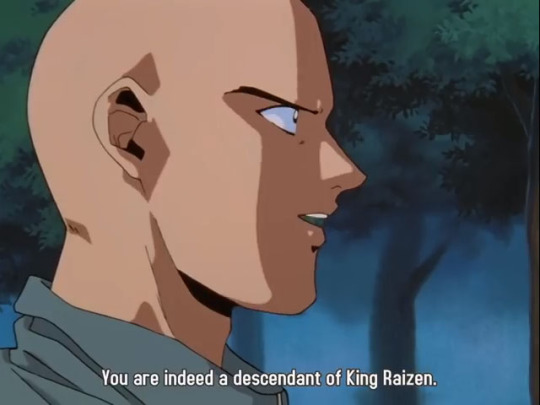
In any case, now that Yusuke’s been deemed worthy, Hokushin steps up immediately to rectify his mistake. And merely admitting an error and explaining himself isn’t gonna cut it in meeting Yusuke’s values - that’s just the bare minimum. A good retainer must know their master so well that they anticipate and go beyond what is merely being requested.
So when Yusuke asks for honesty, not only does Hokushin give that, he takes it one step further with his very succinct, very personal answer to Yusuke’s question of why he follows Raizen. (Paraphrased) "Because King Raizen is like you. Fighting at his side makes me happy. That's everything to me." I can't think of a more perfect reply to mollify, impress and intrigue Yusuke as quickly as that. And in both manga and anime they give Yusuke this little pause as he takes it in - the animation team makes this even more exaggerated than what Togashi did. What I also love is that the dialogue in this scene strongly implies that Hokushin knew how to respond because he knew Raizen so well.
Obviously more stuff happens in the year and a half they spend together in the Makai. Whatever happens, it's clear Yusuke comes to trust Hokushin a lot. He even tells him private, personal things of a nature we don't see him sharing with any other characters. To me, this signals that Hokushin did what a good loyal retainer does, which is to get what makes Yusuke tick and not repeat the same mistake again. (Which is why I always get annoyed at that unnecessary scene they added in the anime version of the tournament... ANYWAYS lol)
Yusuke and Hokushin: the duty of the master
Yusuke starts the series as a solitary delinquent. He despises convention and authority, and dependence on others is a pain. He generally puts on a disaffected attitude, and he often downplays serious emotions with distracting and emotionally shielding tactics like sarcasm. For a character like him, it’s pretty easy to imagine him being all “What the hell, I don’t want to be king! I don’t need a servant!! Go away”. To reject Hokushin’s presence or role totally wouldn’t be out of character.
One of the things I love about the dynamics between Yusuke and Hokushin is that Yusuke clearly gets Hokushin's mindset, and because of it, steps up in order to be able to reciprocate the relationship. In the classic ideal, the existence of the master gives the retainer’s existence purpose. A warrior without a master is considered ronin, which is a very shameful status. The master’s duty is to be(come) worthy of the loyal retainer’s devotion and to recognize the latter’s value and loyalty, often in unspoken ways.
Yusuke doesn’t want to be king - he outright says that he doesn’t think himself smart enough to take care of everyone in his kingdom. But he accepts the responsibility of his role in his relationship with Hokushin.
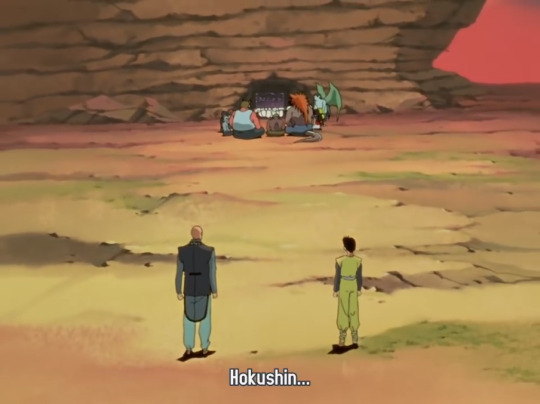
Yusuke’s conversations with Hokushin tend to be discussions that are not only honest but also mature. He takes good opportunities to rely on, and to acknowledge, Hokushin as a retainer without hesitation and without pretending complaint. He actually behaves a lot like a lord in the classic relationship in terms of conveying authority, direction, and intimate concerns (in his Yusuke way lol).
In the meeting with Yomi, Yusuke’s use of the rurimaru is shocking to Hokushin, but when you watch the way the scene is carried off, he bears himself really well in his role. He didn’t carve the rurimaru just because he couldn’t find paper for his lottery names - he specifically chose to do it to the rurimaru, and their value is clearly taken into consideration for his purpose. He also doesn’t crack jokes about having vandalized the gemstones, which, again, would not have been out of character for Yusuke. Instead, he merely presents them exactly the way they should be - as a gift - to ensure he gets Yomi’s attention about his proposal. His body language is dead serious, and he also doesn’t address Hokushin's shocked reactions through the entire scene. He only addresses Yomi. This is totally appropriate form as one ruler to another.
And even after the kingdom is dissolved, Yusuke doesn’t abandon his people, nor shoo Hokushin off. Hokushin is nearly always at his side throughout the tournament. If we look back at the principles of the loyal retainer archetype, one of the things worse than death is to be told by their master "I don't want you for a servant. You’re a useless burden to me". Of course, another aspect of the archetype is that actions speak louder, so the worst would be actually doing things that reinforce/confirm that statement, but it would still be extremely wounding.
A very clear demonstration of the above is when the two of them arrive at the edge of Yomi's territory. The conversation is basically as follows.
Yusuke: OK thanks for guiding me here. You go home now. Dangerous I go alone you know the drill. Hokushin: No, I'm coming with you. You’re my king. It's my duty to protect you. Yusuke: *after a pause* OK fine behave yourself.
with no further argument from Yusuke. No complaints about being called king, no sarcastic remarks about having a tagalong, nothing. Which is not something we usually see or would expect from him. The emotionally downplayed way the entire conversation happens is also very typical. In light of his character and the dynamics of the master-retainer relationship, Yusuke’s behaviour is extremely thoughtful and kind.
Yusuke and Hokushin: the duty of the servant
So Yusuke weighed Hokushin’s response and knew there there was no way Hokushin would have let him go into enemy territory alone. So? It’s not like it’s the first time he’s ever disagreed with someone over how something should be done. So what’s different about this situation, compared to how things might have gone down with any other character who is very close to/invested in Yusuke and has previously confirmed they WOULD be willing to risk death for him - Keiko or Kuwabara, for example?
The difference (aside from the fact that they’re civilians and Hokushin’s a warrior, and Hokushin’s obviously a lot stronger and more likely to survive in most situations) is that Keiko and Kuwabara are Yusuke’s friends. Or more, if you want. But even for other people close to Yusuke who ARE warriors, the biggest difference is that they are not bound in servitude to him. Again, the keyword here is duty - and that concept is huge. Yusuke’s friends want to help him. Hokushin wants to help Yusuke too, but not only that, he MUST help Yusuke. His very existence is an obligation to do so. In some cultures, especially modern ones where the emphasis is on the individual, this can be difficult to appreciate and/or seen as an illogical insanity, but it’s a matter of fact for the loyal retainer. They see themselves as an extension of the will of their master.
Keiko and Kuwabara and any of Yusuke’s other friends mentally would have a normal person pause of “This is ridiculous, stupid Yusuke, you’re crazy!!” and still try to do self-preserving-type things in most instances. To some degree, there’s still an aspect of their decision-making that is not only about Yusuke. They still have a sense that in their relationship with him, they have roles of similar or equal value/weight.
That’s absolutely not true for the loyal retainer. The servant is not equal to the master and the servant firmly believes this because that’s what their existence is defined by. Plus those ingrained principles. For Hokushin, there’d be no normal person pause. We’d zip through that flowchart and he’d be like “You’re crazy. But you’re my king. Guess I’ll die” and like jump into an active volcano or whatever. He would be completely and unhesitatingly willing do something, whether it’s spur-of-the moment or deliberately planned, that would result in death if he thought it’d help safeguard Yusuke/achieve Yusuke’s endgoal. And obviously that's the last thing Yusuke wants.
With this character archetype, this is where a lot of stories end up going for the “and then one of them pretended to let the other person have their way before SURPRISE KNOCKING THE OTHER PERSON UNCONSCIOUS TO PROTECT THEM, and then they went on to do their selfless ‘getting killed in your place’ thing” which I’m super glad Togashi never resorts to. Since all the above builds up to a huge part of what makes the reveal of Yusuke’s gift to Yomi extra effective - Hokushin’s reactions. This is largely why the scene is so comical, because Hokushin’s manner grows more and more freaked out - and entertaining, being in direct contrast to his stoic retainer archetype. Meanwhile, as mentioned previously, Yusuke’s bearing (if not his manner of speaking...) is exactly as a lord in the midst of negotiations would be. (My favourite part is where Hokushin still tries his best to address Yusuke properly as king, before losing it when he finds out Yusuke vandalized the rurimaru. In the manga, his expressions are beyond hilarious. In the anime, his scramble to recover the appropriate body language is really cute. His constantly shifting expressions throughout the background of this entire episode are great too. I always really like the faces in the episodes directed by Enomoto Akihiro.)
Finally, food.
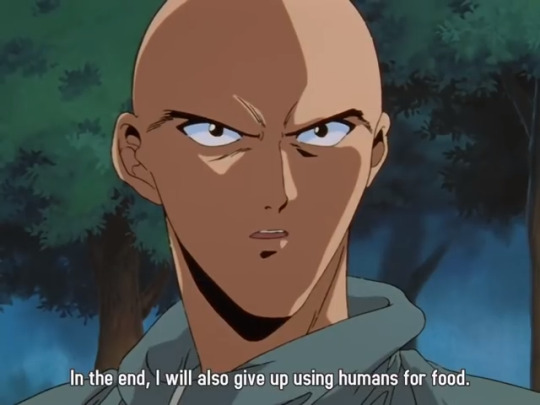
One more challenge with Hokushin is his diet. He needs to eat humans or will suffer from the same malnutrition that is sapping Raizen’s energy and killing him. At the same time, he’s depicted as a character of integrity and compassion, so I always feel obligated to think carefully about the topic of procuring a human for food. I take a stab at an idea in the prequel Mirror Most Dark. However, the approach isn’t very feasible for the time period of actual Yu Yu Hakusho.
From a writing perspective, the problem is one of scale. It goes beyond Hokushin as an individual to the situation of a reliable/sustainable food source in Raizen’s kingdom for the % of Raizen’s population that needs it. And whatever it is, Hokushin is likely highly involved as the main instrument of Raizen’s will. I have some ideas but haven’t really cared to flesh (haha) them out to a point that’s satisfactory to me yet, so it’s only barely touched on in One and a Half Revolutions. This is far less of an issue after the series ends, when you can easily come up with ideas on how they’re looking for or have found alternatives, but during the time period of the actual series your options are more restricted.
I have lots more stuff around these themes and ideas planned for North Bound too I JUST NEED TO GET AROUND TO DRAWING THEM
In conclusion, thank you for reading this mess lmao.
#yu yu hakusho#hokushin#fanfiction#fanfics#writing#characterization#urameshi yusuke#raizen#yyh north bound#yyh ends of the earth#yusuke and his nanny
33 notes
·
View notes
Text
Jakob excels at the sovereign submissiveness of his at once subordinate and superior performance, and holds up its principles even when he is offered special treatment by Lisa and her brother. Claudia Liebrand has described this as follows: “Sowohl Ohnmacht als auch Versagung verlieren für Jakob also ihren Schrecken, weil sie von ihm selbst induziert sind, weil es sich nurmehr um Effekte einer Simulation, einer Inszenierung, eines Spiels handelt, dessen Regeln er bestimmt” (Both powerlessness and frustration lose their fearfulness for Jakob, because he has induced them in himself, they are nothing more than the effects of a simulation, a theatrical moment, a game whose rules he determines). He becomes a virtuoso at conducting his own play—in the sense of game and performance—of absolute servitude. This simultaneous debasement and empowerment of the subject is reflected in the perpetual shifting of Jakob’s feelings between smallness and grandeur, impotence and omnipotence, obedience and transgression. After the principal’s declaration of love for his pupil towards the end of the novel, it is Jakob who insists on maintaining the hierarchical relationship. He enjoys being thrown out of Herr Benjamenta’s office, and indulges in self-assured laughter: “Wenn ich so lache, nun, dann steht nichts mehr über mir. Dann bin ich etwas an Umfassen und Beherrschen nicht zu Überbietendes. Ich bin in solchen Momenten einfach groß” (When I laugh like this, nothing stands higher above me. Then I am something that can't be surpassed by surrounding and conquering me. In such moments I am simply magnificent). Herr Benjamenta fulfills his assignments in turn by enacting the roles of both “Riese” (giant) and “entthronter Herrscher” (ruler without a throne). Paolo Virno recently introduced the idea of virtuosity as “an extremely modern servitude” , as a way to explain the performative quality of those non-material skills and services that shape post-industrial information society. Detaching the concept of virtuosity from its more common context in the performing arts and tracing its history from Aristotle via Marx to Hannah Arendt, he detects both its inherent potential of non-productive service labor and its capacity for representing a type of political agency born out of the excellence of a leader figure. Virno’s rethinking of the concept aims to restore this political agency to the “general intellect” of today’s virtuosic service providers, and encourage their “exodus” from stifling corporate structures. The double-edged movement of exodus as both liberating and traumatic departure will indeed inflect the present readings of Walser and Sebald. However, while Virno’s intriguing notion of servile virtuosity can function as a point of departure for reconsidering Jakob von Gunten, the virtuosic servants of Walser’s novel follow their own course. What Walser rehearses, in the first instance, is the subversive drive of virtuosity within, rather than after servitude. Walser’s Jakob does not want to abandon servility; he refines and mocks its rules and rituals, which can only be done if those very rules and rituals are firmly in place.
Lucia Ruprecht (Emmanuel College, University of Cambridge), Virtuoso Servitude and (De)Mobilization in Robert Walser, W. G. Sebald, and the Brothers Quay (trans. me </3)
#jakob von gunten#literature#we really did ourselves no favors trying to read this in german huh#kind of forced the professor to enforce the most simplistic interpretation possible
1 note
·
View note
Text
Camp Mockingjay - Ch 9
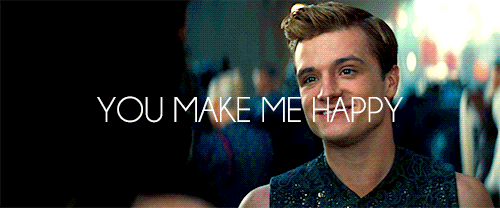
We asked, you voted, and finally, FINALLY, Katniss is going to kiss that big old cinnamon bun!!! Will sparks fly? Will they get poison ivy on their nether regions? Will Gale find a way to intrude on this too? The suspense is killing me! Let’s find out now, shall we? Without further ado, chapter 9 of Camp Mockingjay, the penultimate chapter, cowritten by @burkygirl and @xerxia31...
You have 48 hours to vote on the direction of the next chapter of the story (until noon EDT on Wednesday, August 16th). Remember: vote in the comments, not in the tags! And don’t forget to spread the word by reblogging. The more fans playing this game, the more fun it will be!
The kiss tastes like surprise, like nights of longing and secret wishes finally fulfilled before sliding into a long, slow smoulder that burns in my belly and ignites a hunger unlike anything I’ve known before.
Peeta rumbles low in his chest and his hands flex to pull me closer. My hands thread through his golden curls as I sample first his top lip and then the bottom one. When his tongue slips past my lips, I grant him entry with a satisfied sigh. It slides against mine, then tickles along the roof of mouth only to plunder its depths again.
The hunger in my belly builds to an ache that spreads along my core until I throb between my legs and my breasts long for his touch.
But not yet. There are so many things left unsaid. It seems Peeta feels the same because he takes that moment to break the kiss, though he doesn’t let me go.
“I have always wanted to do that,” he whispers, and the tremor in his voice matches the one I feel inside.
“Yeah?”
“You have no idea,” he says, the words ghosting across my lips. “How hard it was for me to leave Panem, thinking I might never see you again. Thinking I'd lost my chance forever.”
“You had to,” I say, enjoying the feeling of his forehead against mine. “You couldn't turn down that scholarship.”
He stops tracing soothing circles on my upper arms, he's still and silent for many long moments. Then he pulls back, his hands falling away, his blue eyes wide and searching. “How,” he says, his voice shaky. “How did you know about that?”
It takes me a few beats longer to realize my mistake. Then my heart rate spikes, and every muscle in my body tenses. Shit, I think. I search around helplessly for a plausible lie. “Uh, I think they announced it at graduation,” I say. But he shakes his head slowly.
“No they didn't.” His voice is soft, but serious. “I didn't get the letter until three weeks after the ceremony.”
“I must have heard it around town?” I shrug.
He laughs mirthlessly. “My mother disowned me when I accepted my spot at college,” he says, and despite the awfulness of his words there's not a trace of self pity. “She was pretty pissed that I'd deviated from her grand plan. I somehow doubt she’s back there bragging about how her son abandoned the family business to doodle and fingerpaint.” I can't look at him, the guilt is nearly overwhelming. “It was you, wasn't it?” he whispers.
“I'm sorry,” I tell him, because I am. Because he's lost so much, and that was never my intention. I just wanted to pay him back. It had seemed like the perfect idea, photographing some of his incredible paintings hanging in the halls of our high school, then submitting a portfolio of those pictures to one of the scholarships listed in the printouts the guidance office had given me.
“Sorry?” He laughs again, and I glance up sharply. His expression has changed to one of awe. “Katniss…” Then he's pulling me into a tight hug, confusing my senses. “Thank you,” he says, then buries his face against my neck.
“I never meant to screw up your life.” I can feel him shaking his head where it's nestled against me.
“You saved me,” he says. “Saved me from what was practically a life of indentured servitude. You gave me a future.” I slide my arms around his broad back again, and standing wrapped in each other in the last of the fading sunset is even more intimate than kissing him had been. “Why did you do it,” he murmurs.
“I owed you.”
His brow furrows and he frowns. Clearly, I’ve said something he doesn't like. “Katniss, what on Earth could you possibly owe me for?”
I shoot him an incredulous look. “The bread of course.”
“The bread,” he whispers. “You mean when we were kids? I think we can let that go, Katniss. And it hardly measures up to getting me a scholarship.”
Hardly measures up? Peeta left bread on my doorstep every night for weeks after my father died and my mother gave up on living. No one paid attention while Prim and I grew thinner and thinner as I tried to stretch what was left to eat in our house. Nobody, that is, but Peeta Mellark.
“Peeta, that bread saved our lives,” I burst out.
“Well you saved mine,” he insists. “I was going to be stuck there forever and you gave me my out.”
I shake my head. What I did is nothing compared to how he risked his mother’s wrath to help us. And he was only a child then. “It’s the first gift that’s the hardest to pay back,” I mumble. And it took me more than six years to do it, six years where every time I saw Peeta’s face - in school, around town - I’d look away, ashamed that after what he’d done for me and Prim, and all he’d suffered to do it, I’d never even said a simple thank you. “You didn’t know me. We had never even spoken,” I whisper. “Why did you, anyway?”
“Why? Surely you know why, Katniss,” Peeta says. “You must have seen how I looked at you. How I’ve always looked at you.” His eyes are bright in the waning light, and so earnest. Something stirs in my chest, warm and curious. Something more than simple attraction.
But Peeta’s life is far away now. He’s never coming back to Panem. And I have Prim and our mother to think about. How could this ever be more than a summer fling?
He flicks the end of my nose with his forefinger. “Where did you go?”
His words bring me back to the moment. I’m alone with Peeta Mellark, the first boy I ever noticed, and the one who risked everything to help me. I could fall for this man. And I might never get back up.
“Peeta, I just don't know how we’d ever make it work. You live so far away and I’ve got so many responsibilities...”
He shakes his head and pulls me close, kissing my hair.
“Katniss,” he murmurs, and I tilt my chin only to get lost in the gentle sea of his eyes. “We’ve already beaten the odds. I’d given up hope of ever seeing you again, and yet here you are. I’ve never felt like this with anyone, ever. Have you?”
There have been other guys. Safer guys, who meant less risk to my heart, but none have moved me the way a single kiss from Peeta has rocked me to my very foundations.
I silently shake my head in reply. He brings his lips to mine again, but he doesn't allow me to sink into the kiss. Instead, he backs away just enough to frame my face with his hands and tilt his forehead against mine.
“If this is meant to be, we’ll find away to make it work. Don’t you think we owe it to ourselves to try?”
Peeta’s heart pounds against mine while he awaits my answer. But what do I do? Do I take this chance, risk my heart to Peeta, or accept that this moment is all we’ll ever have and try to forget?
168 notes
·
View notes
Text
Souta, Son of the Chariot
This was tipped off to me by @inn-8-woolgatherer and further consulted by @karnasofsun on twitter.
In the hindu epic Mahabhrata, there is a character known as Karna. Karna is a demi-god, that is the half blooded son of a divine entity and a human. Kunti the princes of the Kunti kingdom had been granted a boon by the sage Durvasa to invoke any deity to give her a child. Eager to test the power while still unmarried she called upon the sun god Surya, and was handed a son Karna. Afraid of being unwed, the illegitiate son was placed in a basket and set afloat among the river abandoned.
The infant was given many names, along with many curses in his life. One of those names was “Souta”, which means son of Souta or belonging to the charioteer caste. In other words despite being half divine, Karna is abandoned or kept seperated from both parents and instead lives a life defined by the station of his perceived birth.
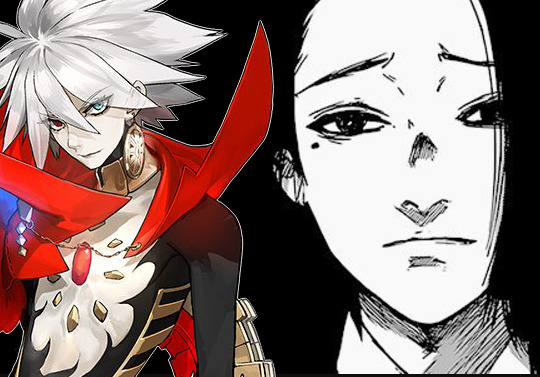
Though he possessed his father's brilliant authority, his form was stained black. His countenance was cruel, and his every action was violent. Because of his lack of human mother, he didn't learn the subtleties of human emotion and spent his days being considered a nuisance by the people around him.
Source [x]
Who are they talking about here, Souta or Karna?
Of course this is from Fate which probably isn’t the best source of mythology of another culture, but if there’s anything to take from it, this is another Japanese interpretation of what Karna would be like represented as a character and it comes off sounding similiar to both the manner in Furuta acts and even his iconography and the way he was raised.
There are clear parallels between the two stories, and the strongest comes from both their origins, and the role they eventually end up taking in the stories, where they both end up being portrayed as villains regardless of what their true intentions are. Mythology, especially Hindu mythology is built around heroes with human flaws, and Karna despite being half god demonstrates a lot of these human flaws and complexity throughout life. Despite being a well intentioned and diligent person, due to a great misfortune he ends up being cast as a villain in his untimely ending.
Perhaps in unraveling his story we’ll find a bit more of what Souta’s current motives might be, and the role in the story he’s meant to take.
There is a lot of Karna’s story to unpack, but to begin with the name Souta originates from his founding by Adhiratha, a charioteer of King Dhirashtra of Hastinapur. Due to being the son of a charioteer, he was therefor himself in the caste of the charioteers for his life.
Here’s a quick article on the Suta, [x] it seems in stories they were for the most part either bards or charioteers. Mahabharata may itself be an exploration of the caste system as a whole as it’s one long epic poem that meditates on a lot of topics [x]. Go read it for yourself, the caste system isn’t going to be explored here other than the fact that it exists.
Furuta as well could be considered a son of a charioteer. The Washuu family has long been associated with tarot card number 7, which is the chariot. There’s a quick overview of the card here [x].
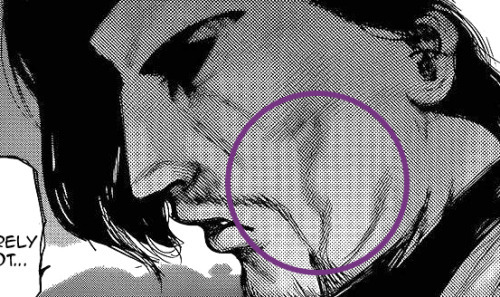
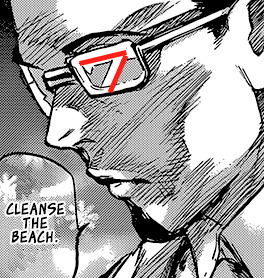
Not only is he the son of a chariot, but despite having royal blood Furuta is placed in a caste that is much lower than the one he ought to belong to. He even tells Kaneki of this in his basic description of the Washuu family tree, that both he and Arima were born as unfit goods which make up the vast majority of V’s servitude.
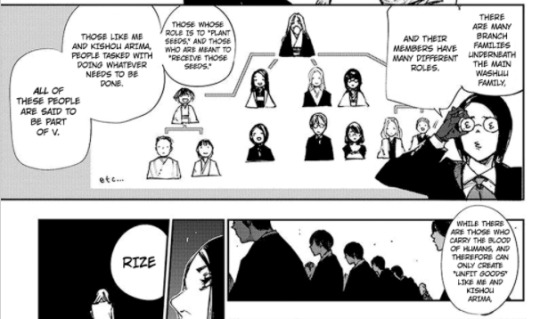
Furuta carries the blood of the absolute leader of the CCG, but he himself was thrown away as a child among the rest of the unfit goods. His mother for the most part isn’t even shown to be alive and we have no idea what happened to her, whereas Furuta knows of his connection to his father but Tsuneyoshi seems to hold no regard for him as a son at all. Furuta says that Tsuneyoshi probably did not remember his name, and the idea of not being able to call his father father, sets him off.
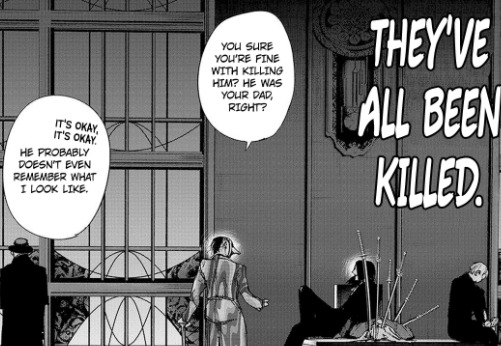
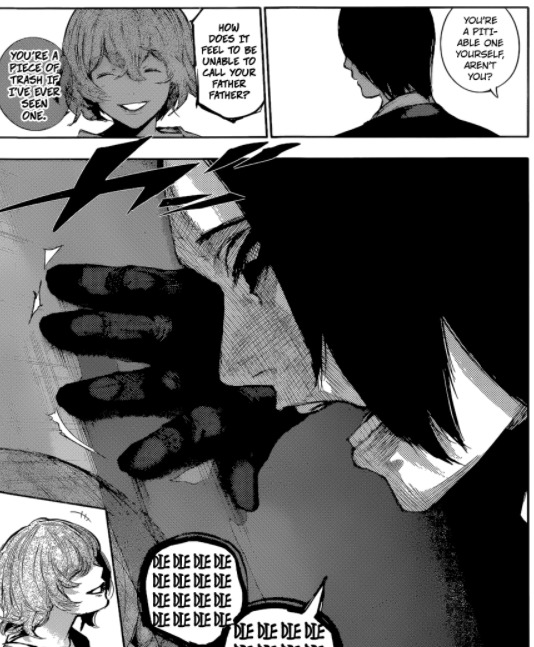
There are some differences the sun god did not forget about Karna, he simply could not interfere in the mortal realm because he was divine. Karna also experiences a similar shaping from his abandoment and a want to prove himself as a warrior despite where he was placed because of Caste. This is of course an idea which contradicts the caste system. Which again, explaining in its simplest form because of time constraints, if you were born a charioteer it is better by the caste to be the world’s worst charioteer than to try being a warrior.
Karna tries to learn from a sage, but is cursed when the sage found out he was a commoner. Later when he waent to a fighting contest and tried to challenge Arjuna, he was laughed at for being a commoner. These were the reasons that the main villain, Duryodhana took him in and asked him to join his team.
Souta, before becoming Kichimura, also had many traits that made him unmistakable for a commoner. His main function was serving paperwork, he was a lackey, first to Kijima and then to Kaneki.

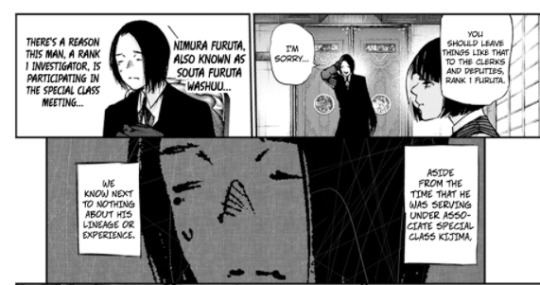
Furuta is even referred to as a dull ranked one investigator that nobody knows anything about. Unlike Arima or Hairu his fellow garden children, Furuta never seemed to rise to any sort of prominence within the CCG, and instead he was accepted in by a different crowd.
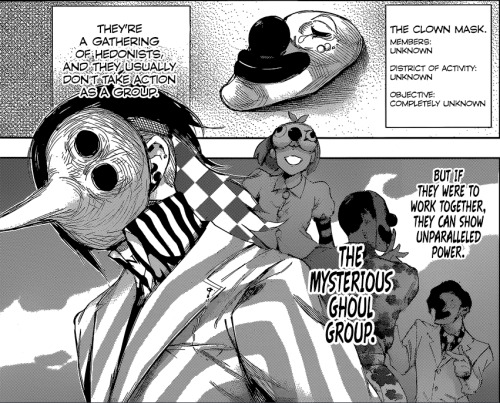
The clowns are also marked as a “Villain Group” the same way Karna himself becomes perceived as a villain in his own story simply by being taken under the wing of Duryodhana.
There is of course differences as Furuta willingly places himself in the seat of villain whereas Karna is merely associated with one as a part of the group he’s in, and Furuta also is much more malicious while Karna was good hearted and tried to curb the more villainous actions of the people he was working with.
However, there is a similarity between the two stories of a hero, stepping into the role of a villain and being slain as a villain.
Ajruna who once again is the man who Karna tried to fight earlier in the legend only to be laughed away. The irony is despite their antagonism and Arjuna’s eventual killing of Karna, the two of them are actually brothers.
But to challenge Arjuna, a member of the royal family, one must be higher than a Kshatriya. However Karna appears to be a lower caste Vaishya (merchant class) or Shudra (a slave). Karna, whose challenge was refused due to the difference in status, was a laughingstock. The one who saved Karna in this situation was Duryodhana, the eldest of the one hundred princes of the Kaurava clan, who opposed the Pandavas.[4] At that time, he already had a premonition that a confrontation with Karna was unavoidable. After all, Karna revered Duryodhana, who regarded the five Pandava brothers as archenemies, like a father.
[x]
The five Pandava siblings are the children of Kunti, who is Karna’s mother who abandoned them which made Karna Arjuna’s unknowing older brother. Of course the accidental killing of family members is common in myth, what sets this apart is Arjuna’s reasoning.
Karna must be killed because he associated with Durydohana, the antagonist to Arjuna’s own story. Karna must become the villain that falls in order to support Arjuna’s rising up as a hero.
When was it that he resolved himself to kill Karna no matter what. Probably, it was when they had first met each other. That was no fate decided by the gods. The karma Arjuna chose together with sheer enmity. Even if it was not righteous. Arjuna had to accomplish that no matter what.
That their eventual conflict was not one that rose about necessarily out of personal differences, as the two of them both were similiar both brothers and both well intentioned, but rather their conflict came about because of their roles in society. What is fate but a metaphor for a role you are meant to live up to, dictated upon you by others?
This inevitably leads to the theory that rather than truly attempting to seize control of the CCG for personal gain and power, Furuta is instead acting as if the villain were a role for him to play so that a great hero can strike him down. There are a few hints of this in canon, Eto says that Furuta cares not for the CCG or the Washuu.
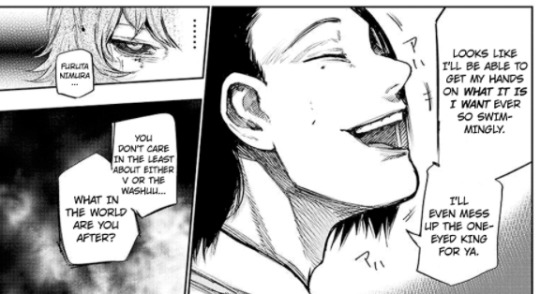
Kaneki asks if he’s really causing all of this destruction just to fulfill his childhood dream of being the head of the Washuu family. Then suggests afterwards that Furuta might not be a permanent fixture atop the CCG.
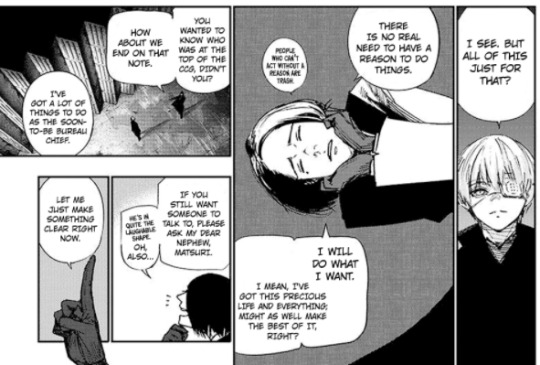
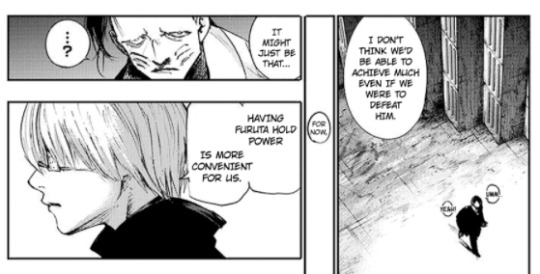
Furuta even suggests a version of the proposed plan to Kaneki, that one of them play a villain so terrible that humans and ghouls have no choice but to unite against him.
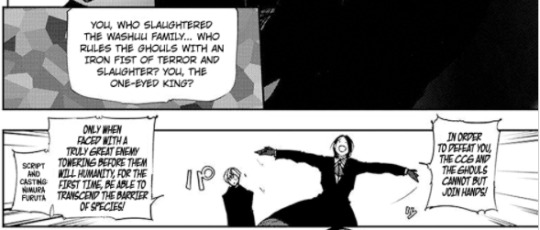
Uta questions much later on whether Furuta’s actions are meant to be an end for ghouls or the CCG. Ui says his rise to power is what signals the death of the CCG.

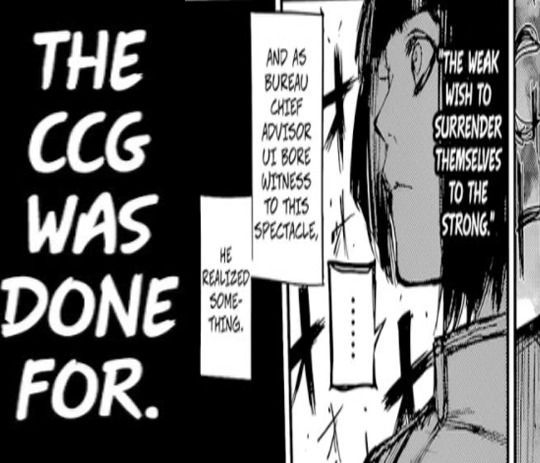
When talking about his plans in general, he uses story terms like “Last Boss”. Which suggests that like the clowns in general he too can think of things in the terms of story structure and layout even when they tend to be happening in reality.
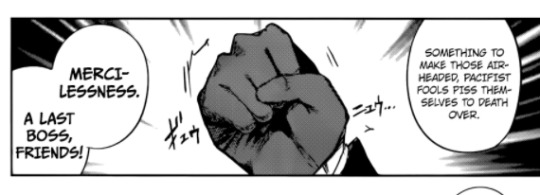
Furuta’s actions in seeding humans among the clown members are said specifically to “make their opponent feel as though they’ve sinned” which could hint that his actions are ironically done to highlight what exactly is wrong with the CCG by turning it up to 11.
His mannerisms as a leader are stolen from others, he speaks with Yoshitoki’s voice and uses Marude’s words, while pushing the situation up to 11 once again almost as if it were a parody of those same well respected leaders.
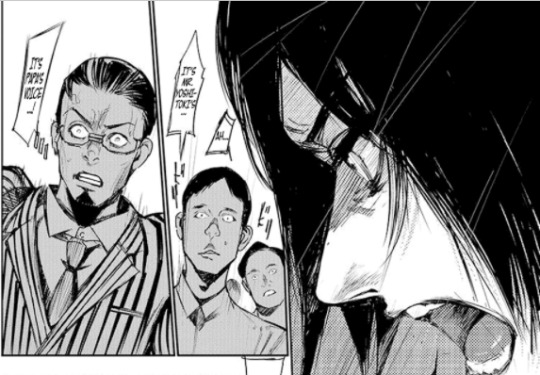
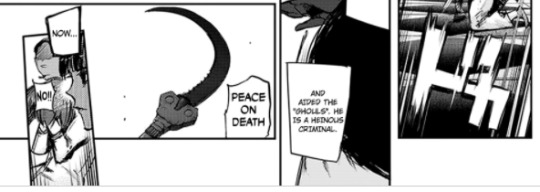
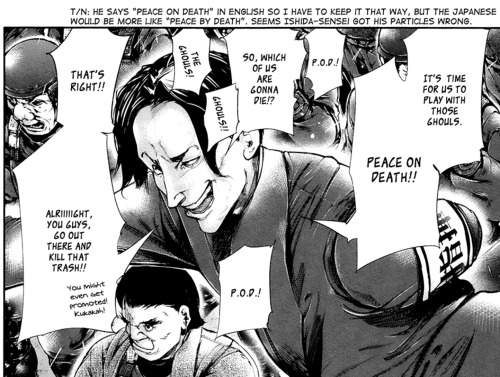
It’s possible that Furuta’s increased antagonism for Kaneki is simply to provoke a fight out of him, to do same as Arima did and make himself into a great villain that now both humans and ghouls have to unite in order to defeat a much greater enemy that threatens them both.
This of course does not excuse Furuta’s lack of regard for life as the stepping stones to his plan, as those ghouls who died along the way can never be returned. Another thing is you are what you pretend to be, so even if Furuta adopts these mannerisms ironically, the tyrannical, manipulative, unscrupulous attitude which he constructs himself with are still actions he chooses to take and those have consequences mostly to the people around him who become victims to his schemes.
However, there’s still a great similarity to be drawn between Furuta and Karna. The both of them half breeds who were destined to be below the ruling class since birth. That despite their position, they were welcomed in by another crowd even though the crown that adopted them turned out to be villainous. That the two of them in thier roles, stretch and question the role of villain and heroes in their respective stories.
#furuta nimura#furuta souta washuu#kichimura washuu#damnit you have so many names#tg meta#meta#tokyo ghoul meta#hindu myth#mythology#mythological parallels
61 notes
·
View notes
Text
The Nietzsche influence on The Secret History - Donna Tart
Nietzsche argues that much of the Greek's impressive progress in culture is the result of the endless struggle between Dionysus and Apollo, rationality and logic versus impulse, chaos and irrationality. Dionysus is the god of debauchery and barbarism thus represents the irrational and animalistic in us while Apollo stoods as the god of logic, reason and rationality. They are not necessary rivalry to eachother but instead are dependent on each other for humanity to survive and flourish, think of two sides of the same coin. The problem with modern society is that we rely on the supremacy of science and reason too much that we tilt the pendulum towards Apollo that our Dionysian side is suffocated and impoverished. And as a result we become sick, depressed and frail when we completely rely on reason and disregard impulse, we run towards civilisation and order and abandon the chaotic realm that is our emotional impulse and needs. Nietzsche calls for the swaying of the pendulum towards Dionysus in our modern society so that we can be more happy and fulfilling.
The Secret History is about a group of Greek scholars descending down the destruction and degradation of characters when they skew to the Dionysian side a bit too much. It is not to discourage us from connecting with our impulse instead it is a premonition of what will happen if impulse reigns supreme and rationality is banished.
The scholars had been interested in "what terrifyingly beautiful things lay behind the veil" since the beginning of the book. They believed that the veil is the logic and reason – all the civisilied “things” we are taught to comply and return to and if we want to truly witness, comprehend and experience “true beauty” we need to rip away that veil. “If we are strong enough in our souls we can rip away the veil and look that naked, terrible beauty right in the face; let God consume us, devour us, unstring our bones. Then spit us out reborn.” The groups agreed that beauty resides not in the rational and reasonable realm but in the deep, chaotic and destructive realm of ourselves. And what claims supremacy and flourishes in emotion, barbarism and darkness? Death because it bares no meanings for us to understand and no mechanism for us to rationalise and comprehend, it is what it is: chaotic, unreasonable and barbaric. Henry concluded “Death is the mother of all beauty” because it is ultimately chaotic and unreasonable, devoid of rationality and logic thus originates beauty. “Beauty is rarely soft or consolatory, instead genuine beauty is always quite alarming” Death gives birth to terror so terror is beauty itself and what is more utterly terrifying for the Greeks than losing control and “to throw off the chains of being for an instant, to shatter the accident of our mortal selves?” completely? They went on a quest to get to the root of beauty and the touch of divinity and in the end they found rot. Henry, the main schemer, had orchestrated many attempts for divinity whether it was in the form of an orgy in a forest or obsessive drinking to debauch their mortality, all attempts were fruitless and Dionysus never returned their call. Mass fornication and drinking were not enough to provoke Dionysus because of the defiency of the emotional and impulsive intensity, they were seemly not enough to appease to the god himself. “False gods savour wine and incantation, real gods demand blood”, as someone had said that I could not quite recall. The spark of divinity arrived when the group finally decided to slaughter the butcher that lived in the nearby forest thus offering complete surrender of their morality and mortal self. That was the beginning of their own downfalls and death. “The vitality of the act was entirely obfuscated, the beauty, the terror, the sacrifice.' He took one last drag of this cigarette and put it out. 'Quite simply,' he said, 'we didn't believe. And belief was the one condition which was absolutely necessary. Belief, and absolute surrender.” “I looked down at my hand and saw it was covered with blood, and worse than blood. Then Charles stepped forward and knelt at something at my feet, and I bent down, too, and saw that it was a man. He was dead. He was about forty years old and he had on a yellow plaid shirt—you know those woolen shirts they wear up here—and his neck was broken, and, unpleasant to say, his brains were all over his face.” Only did then Dionysus reveal himself and the beautiful and glorious world of chaos, darkness and barbarism – true beauty was unveiled to them in an intense and dizzying moment. They had offered their sacrifice – blood and the butchered flesh of another man and bared their throat and offered complete surrender to Dionysus “It was heart-shaking. Glorious. Torches, dizziness, singing. Wolves howling around us and a bull bellowing in the dark. The river ran white. It was like a film in fast motion, the moon waxing and waning, clouds rushing across the sky. Vines grew from the ground so fast they twined up the trees like snakes; seasons passing in the wink of an eye, entire years for all I know.… I mean we think of phenomenal change as being the very essence of time, when it’s not at all. Time is something which defies spring and winter, birth and decay, the good and the bad, indifferently. Something changeless and joyous and absolutely indestructible. Duality ceases to exist; there is no ego, no “I,” Dionysus had entered and consumed them and all actions were disrupted of their chronological order, grobed and forced into a single, condensed, explosive and glorious moment: true beauty. Every sense was stimulated to the extreme: vision, audition, olfaction and somatosensation experienced vivid hallucinations that seemed to exceed all rationality and our logical understanding of nature (“seasons passing in the wink of an eye”, “The river ran white”, “Vines grew from the ground so fast they twined up the trees like snakes”). They had successfully abandoned the Apollonian realm and descened into the Dionysian realm and there laid true beauty. That ritualistic night set off a chain reaction of events that signaled the downfall of their own characters. Bunny, the one that was left out of the ritual, had witnessed everything so he started to blackmail them into servitude and submission. The blackmail started off as slight taunting and emotional toying with them by joking around that he would tell the police about the murder then it quickly escalated to demanding lavish dinner at Italian restaurants and expensive trips to Rome. The remaining scholars were inreasingly fed up with the constant demanding and humiliation by Bunny and so Henry had played that frustration to his advantage and offered a solution to the blackmail: kill Bunny. The first initial reactions of the scholars were actively opposed to the mere idea of killing someone again but the frustration escalated and piled so they finally agreed to the plan. The whole gang gathered one snowy morning and lured Bunny to the top of a hill during his daily morning jog then Henry pushed him down the ravine. Bunny was their second murder and it ultimately was a strong repercussion to their psyche and character. After the murder of their friend, they started to suffer consequences for their actions not by an external force but from the inner turmoil. Charles spiraled down alcoholism and started to display abusive and obsessive behaviour towards his twin sister - Camillia which was also his incestuous lover. Richard suffered from depression while Francis was literally cripped with fear and anxiety that he laid in bed all day. Camilia became less passive and observant after the murder and she also mingled in a relationship with Henry. The tranquility and harmony between the scholars became increasingly disturbed and intense that they quarreled with each other constantly and the breaking point was when Charles carried a gun to Henry’s motel and threatened to shoot him dead. In the end, Charles and Henry struggled and fought each other then ultimately Henry shot himself in the forehead to leave this wife “an honourable way”. The disturbance in their characters were exacerbated worse after the death of Henry. In the end, Francis, who was a closeted homosexual, agreed to a marriage with a girl he did not love just to keep the inheritance from his uncle. Charles dwelled deeper into alcoholism that it paralysed his consciousness so Camilia had to take care of him when he blacked out. Richard, the main narrator, suffered from severe depression while Camilia conformed to a life of celibation in a large and lonely house. In some way, their existences had been tainted forever since the ritual night. We witness the transcendence from the realm of Apollo to Dionysus of the ancient Greek scholars, from intellect, reason and culture to animalistic, chaos, impulse and murderous to attain true beauty and reach divinity. This quest for beauty and divinity comes at a very fatal and costly price: the downfall of their own characters and the annihilation of all reason and intellect. Donna Tartt does not put the supremacy of emotion and impulse on the pedestal and tells us to follow our heart. The Secret History is a premonition to warn us about the fatal consequences of the complete abandonment of reason and indulgence in animalistic and impulsive desires. Beauty is truly a terror.
10 notes
·
View notes
Text
“Chosen One” Pt 3
This was originally an essay I wrote as a freshman in college, so it’s a... little rough. I’ll add my sources again at the bottom just because force of habit will make me anxious if I don’t..... this is technically an “academic” paper I wrote lol. This is long. @npd-starscream
The Jedi Order's belief that emotion can only distract from seeing the world as it truly is, and that it can only conflict the person who has them, was a direct source of their failures in the second Star Wars trilogy, episodes I-III. Ignoring emotion and the passions, or pretending like they don't exist to try and gain objectivity tends to be a philosophically contradictory practice. Emotion is required to make logical decisions, for survival, motivation, and can serve all three parts of Plato's divided soul.
The Jedi Code & "The Slave Metaphor"
"There is no emotion. There is peace. There is no ignorance. There is knowledge. There is no passion. There is serenity. There is no chaos. There is harmony. There is no death. There is the Force" (Simpson). The absence of emotion in the Jedi Code is meant to make those who follow it more rational, objective and fair. It is often times assumed that the lack of emotion equates itself to logical thinking, and this is generally accepted in society, even today, and is a common philosophical concept. "One of the most enduring metaphors of reason and emotion has been the metaphor of master and slave, with wisdom of reason firmly in control and the dangerous impulses of emotion safely suppressed..." (Solomon 3).
A Phantom Menace
A Phantom Menace, while sometimes considered inessential to the entire story arc of Star Wars, is a shining example of the illogical nature of the Jedi Code. The abandonment of emotion might be attainable for some forms of alien life in the Star Wars universe, but is it not only extremley harmful to human beings, it is also pretty much impossible. One immediate issue that arises in The Phantom Menace is not only that this is harmful to people, but that this is extremely harmful to children and would effect them for the rest of their lives.
A new study from UCLA suggests that a loving parental figure may alter neural circuits in children that could influence health throughout a lifespan. On the flip side, the negative impact of childhood abuse or lack of parental affection take a mental and physical toll can also last a lifetime. Childhood neglect increases adult risk for morbidity and mortality. (Bergeland)
This would effect every Jedi Padawan, although some of them turn out better than others. In The Phantom Menace, we are obviously not foreshadowing the failure of every single Padawan, and obviously some of them have made it through this process to become Jedi Knights and dismember droids and impose their holiness upon the rest of society, which is annoying but not at all the worst outcome that could've been a product of their childhood. Nor is the worst outcome when a Padawan walks away from the Jedi Order to wander the streets of Coruscant to impose their own sense of justice without any sort of governing body, like Ahsoka Tano (The Wrong Jedi).
No, obviously the worst possible outcome of these denials of attachment and emotional validation presents itself in the Star Wars universe is a tall, ugly, wheezing metal machine they call Darth Vader, who started out as one of these Padawans and grew up to me one hell of a emotionally stunted mass-murderer. It's not to say that he isn’t responsible for his actions, just as any murderer is, at least in part, responsible for what they have done. But the Jedi order claims to have the moral superiority, and condemn those who end up like Vader, but the reality is, even if Vader's action are truly his responsibility, and his responsibility alone, they could've been prevented by the Jedi order had they taught him to understand and accept his emotions.
Now of course, the Jedi sculpt themselves not for their own benefit, or for any other Jedi's benefit, but rather to see how they could best serve others who cannot themselves. Eudaimonia is a Greek term used by Aristotle to talk about the concept of "the good life". Which on the surface seems utterly converse to what the Jedi believe in, duty, service, lack of worldly belongings, etc. But to Aristotle, this concept of Eudaimonia isn’t just having things or simply being happy, rather the concept is meant to say that life is not fulfilled until you reach your full potential. If the Jedi wished to serve their galaxy to the best of their ability, then they would have to come to the understanding that alienating themselves and the younger, perhaps unwilling, members of their order from emotion and from others does not further their goal of servitude, because doing so would mean that they would not and could not serve their galaxy to the best of their ability.
Attack of the Clones
There is a really obvious metaphor in the Star Wars prequels about the modern western world and ancient Rome, and in the same parallel, there was a school of philosophy that existed in ancient Roman times called Stoicism. Stoicism can be explained simply as, "Stoics... hold that emotions like fear or envy... either were, or arose from, false judgements" (Baltzy). However the views of the Stoics oftentimes contradicted the environment and society they lived in, as Robert C. Solomon explains, "Stoics analyzed emotions as conceptual errors, conductive to misery... Emotions in a word, are judgements- judgements about the world and one's place in it. But the world of Roman society was not a happy or a particularly rational place," and goes on to note that Seneca, an influential Stoic who served emperor Nero, went on to commit suicide (5).
The Clone Wars
The Star War: The Clone Wars animated series provides a look at the missing pieces to Anakin Skywalker's fall to the dark side. There is one main plot event in the television series of particular relevance, that shows how his character is more prone and inherently drawn to the side of the dark, and showcases more information that provides insight to his final moments of weakness.
These events occur when Obi-Wan, Ahsoka, and Anakin become stranded on a strange planet home to beings that are extremely powerful in the force. These beings are essentially embodiments of the light, dark and balance (Overlords). There are three episodes that take place here and involve these characters, and the central plot revolves around how Anakin must take the place of the 'father' of the embodiments of light and dark, because only he can 'control' them. This view is similarly expressed by Obi-Wan in Revenge of the Sith when he says, "You were supposed to bring balance to the force, not destroy it" to an immolated Anakin Skywalker.
Anakin makes similar, and poor, decisions in these episodes as he does in Revenge of the Sith. Overlords, Altar of Mortis, and Ghosts of Mortis, he lives up to Obi-Wan's statement of "destroying" the force. Instead of keeping the literal embodiment of darkness from getting to the rest of the galaxy, he instead decides to help it after it shows him his future. It's interesting because he sees all the stupid mistakes he's going to make, and for some reason believes in this dark side entity that promises, in essence, the best way to avoid making those mistakes later in life is to just make them as soon as possible. It is important to note that Anakin is willing to sacrifice himself and what he believes in for this entities' promise of peace. This is another example of how denying the need for Eudaimonia when wanting to serve others becomes harmful. Anakin is not at peace because he can't handle his own emotions, and does not care if he destroys himself to achieve the Jedi goal of peace, and this, by consequence, convolutes this idea of peace, and turns into this sort of "the ends justify the means" belief.
At the end of these three episodes, Anakin says, "You will not understand what I have to do to end the clone war. You will try to stop me. I have seen that it is the Jedi who will stand in the way of peace" (Ghosts of Mortis). Even in the ugliest moments of Anakin Skywalker, he's talking about achieving peace, a goal set by Jedi, not Sith. But in the end of this, his memory is erased and he returns to being "light side" Anakin.
However, there is another important concept that can also be explained by the episode of Star Wars: The Clone wars, Overlords where Anakin balances the force and holds back both the light and the dark. Descartes (1596-1650) had a view on emotion that was "value-oriented" (Solomon 7), meaning that they had a particular role to play in aiding reason, and where the two would be in coordination. Descartes' provides this example of using courage to motivate,
To excite courage in oneself and remove fear, it is not sufficient to have the will to do so, but we must also apply ourselves to consider the reasons, the objects and examples which persuade us that the peril is not great; that there is always more security in defense than flight, that we should have the glory of joy of having vanquished, while we should expect nothing but regret and shame for having fled and so on. (Solomon 6)
In this example, emotion and reason are in lockstep. Neither hold a higher balance than the other, rather both are important to survival, and emotion is necessary in making a logical decision. It allows the decision maker to motivate themselves to do what is right, by emotion alone, as Hume would argue.
Revenge of the Sith
All the components that led to Anakin's fall finally break through to the surface in Revenge of the Sith (ROTS). The opening plot point to this movie, when then Chancellor Palpatine is "captured" by the separatists, shows the contradiction in the Jedi code and then the actual practice of the Jedi that Anakin had so obviously struggled with. This contradiction lies in the line of the Jedi Code that goes as follows, "There is no emotion, there is peace" (Simpson). This seems to make sense at first glance, but its' shortcomings in comparison to other beliefs held by the Jedi, are clearly demonstrated when Anakin kills Count Dooku. Emotion is not the opposite of peace. Anakin kills someone who is a great threat to the galaxy, and their universe would have hypothetically been more peaceful without Dooku. Emotion drives Anakin to act for peace, not lack of it. This confliction further warps his views as the movie progresses, and this is where the ideals of the Jedi truly fail him.
It was peace that truly drove Anakin, even for selfish reasons, up to this point in his life. But his story is a clear example of Hume's motivation theory, that reason itself cannot provide the will to take action. In Star Wars the Jedi code and their other ideals often parallel the Kantian idea of "duty", that is to do good for good's sake, or "A will estimable in itself and good without regard to any further end" (Kant 197). However, not conversely to this, Hume "came to question the role and capacities of reason itself, and in particular the power of reason to motivate even the most basic of moral behavior" (Solomon 7). Meaning, Hume wasn't directly disagreeing with the idea of doing good for good's sake, but rather what would motivate you to do so. Kant believed that this sense of "duty" was enough, but Hume believed that emotion was required to make someone act on this sense of "duty".
These arguments are played out at the end of ROTS when Anakin is provided with not only an idea of "peace", a dictatorship but also the will to do so, because he believes going down this path is the only way to save his wife. Anakin plays the part of Hume's argument, that there must be some incentive to want to take moral action, and he makes Hume look rather sinister. But Hume's argument doesn't have to end in fire, burning, and destroying a lot of things you care about, and nor would have Anakin needed to go that far to prove that point. Would he have made such a move for (what he believed was) peace had his wife's life not been threatened? Or conversely, on the side of Kant, would Obi-Wan been able to destroy his friend if not for his sense of "duty" to do so?
In the end, however it is emotion that is the downfall of not only Anakin Skywalker, but the entire Jedi order (by his hand), so it is easy to return to the "Slave Metaphor" and blame this on emotion running amok. But is also the original denial of emotion early on in Anakin's life that led to the insecurity and lack of control over them. So what is it then? Reason is greater than the passions? Or as Hume put it, "reason is, and always should be, the slave of the passions" (Solomon 1)?
Return of the Jedi & Plato
At the end of Anakin/Vader's story, he supposedly returns to the light. The idea that emotion is inferior to reason, especially when it comes to how they relate to making moral judgements, can be further discarded, by looking at why he returned to the light. He made this decision as he did all his decisions, emotionally. Seeing his son's loyalty to goodness and to the light is the final turning point where he seems to denounce the ways of the Emperor. But this doesn't make him a Jedi, and it's not a decision he made by the grace of reason.
How, then, would Plato describe such inconsistent moral judgements? "In book IV of the Republic, Plato's descriptions of psychological conflict include cases in which agents (people) perform acts contrary to what they take to be the best course open to them" (Lesses). However, it wouldn't be correct to assume that Anakin didn't think he did exactly what he had to do in ROTS. The blame for this isn't to be put on merely logical thinking, but rather on the fact that he was taught consistently that his emotions were worthless, and by extension himself. So destroying himself to help someone he loved would've seemed perfectly acceptable, and the correct course of action. Regardless of whether he thought he was being logical, however, Anakin did make an illogical decision.
In order to understand how agents can act contrary to reason, we must examine Plato's parts-of-the-soul doctrine. Plato distinguishes three parts of the soul in Book IV (of the Republic): (I) reason (II) spirit, and (III) appetite. Agents are susceptible to several, relatively independent sources of motivation because each part of the soul has a characteristic motivation. (Lesses 148)
This then, supports the "Slave Metaphor". But Plato treats the passions differently, because his definition of reason is different. According to Plato,
It (the sun) is the cause of knowledge and truth; and so, while you may think of it as an object of knowledge, you will do well to regard it as something beyond truth and knowledge and, precious as these both are, of still higher worth,… In our analogy of light and vision were to be thought like the sun, but not identical with it, so here both knowledge and truth are to be regarded like the good. (Fogelin 371)
This means that if someone is wise, they are closer to the light, that if they are closer to the light than they are closer to the "good" although those three things are not all the same. So here, making a logical decision would be the same as making a moral decision. Vader's sparing of his son and act against the emperor is an emotional decision, but it is a move towards the light, and therefore, by Plato's terms, also a move towards reason/wisdom. Most importantly, he would have not made this decision without the role of emotion.
The incorrectness of the light and dark binary in the Star Wars universe can be clearly seen here, and we can see how Anakin/Vader balances and is attuned to both. On one side, we have Plato's "light" and on the other side, we have emotion & what Plato calls appetite."Plato accepts the occurrence of weakness" (Lesses 148), and serving only the appetite would be seen as weakness. Plato did believe that reason should be above the appetite, but not for the same reasons as the Jedi. In fact, "Each part (of the soul)… involves different sorts of desire" (Lesses 148). The pull of the three parts of the soul, reason, spirit, and appetite, can explain the inconsistencies in Anakin's full story arch, and where the motivation to do good really came from. This binary of light and dark are not what the Jedi said they were, emotion can serve both the light and the dark, reason or appetite, destroy the Jedi or the Sith Emperor.
Closing Thoughts
The denial of the passions leads to an imbalance, because they play a role in each part of Plato's divided soul, in motivation, in reasoning for survival, and personal well-being. No real life school of philosophy can truly entirely exclude the role of emotion without contradicting itself or otherwise causing harm, and so therefore neither can fictional philosophy. The Star Wars prequels show the harm in this, and even though it is fictional, the complete neglect of emotion and the consequent issues are supported in real life.
Emotion does not belong to a "light" or a "dark" side as it is made to seem in Star Wars, but even the originals conflict this sentiment. If anything, the prequels exist to show that sentiment is actually the downfall of an entire order.
"Akrasia". Collins English Dictionary - Complete & Unabridged 10th Edition. HarperCollins Publishers. 19 Jul. 2016.
Altar of Mortis. Dir. Brian Kalin O'Connell. By Christian Taylor. Perf. Matt Lanter, James Arnold Taylor, Sam Witwer. Lucasfilm, 2011. Television.
A New Hope. Dir. George Lucas. Perf. Carrie Fisher, Mark Hamill, and Harrison Ford. Lucas Film Ltd, 1977.
Attack of the Clones. Dir. George Lucas. By George Lucas and Jonathan Hales. Perf. Hayden Christensen, Natalie Portman, Ewan McGregor. 20th Century Fox Film Corp., 2002. DVD.
Baltzly, Dirk. "Stoicism." Stanford University. Stanford University, 15 Apr. 1996. Web. 26 July 2016.
Bergland, Chistopher. "Parental Warmth Is Crucial for a Child's Well-Being."Psychology Today. Psychology Today, 4 Oct. 2013. Web. 24 July 2016.
"Eudaemonia." Merriam-Webster.com. Merriam-Webster, n.d. Web. 26 July 2016.
The Empire Strikes Back. Dir. Irvin Kershner. By Leigh Brackett and Lawrence Kasdan. Perf. Mark Hamill, Harrison Ford, Carrie Fisher, and Billy Dee Williams. Twentieth Century-Fox Film Corporation, 1980.
Fogelin, Robert J. "Three Platonic Analogies." The Philosophical Review 80.3 (1971): 371-82. Web.
Frede, Dorothea. "Plato's Ethics: An Overview." Stanford University. Stanford University, 16 Sept. 2003. Web. 18 July 2016.
Ghosts of Mortis. Dir. Steward Lee. By Christian Taylor. Perf. Matt Lanter, Lloyd Sherr, James Arnold Taylor. Lucasfilm, 2011. Television.
Kant, Immanuel. The Foundations of Ethics. Trans. James Ellington. Indianapolis, Indiana: Hacket, 1981. 194-213. Print.
Lesses, Glenn. "Weakness, Reason, and the Divided Soul in Plato's Republic." History of Philosophy Quarterly 4.2 (1987): 147-61. Web.
Lewis, Michael, Jeannette M. Haviland-Jones, and Lisa Feldman. Barrett.Handbook of Emotions. New York: Guilford, 2008. Print.
Overlords. Dir. Steward Lee. By Christian Taylor. Perf. Matt Lanter, James Arnold Taylor, Ashley Eckstein. Lucasfilm, 2011. Tevision.
The Phantom Menace. Dir. George Lucas. By George Lucas. Prod. George Lucas. Perf. Liam Neeson, Ewan McGregor, Natalie Portman, Jake Lloyd, and Samuel L. Jackson. 20th Century Fox Film Corporation, 1999. DVD.
Return of the Jedi. Dir. Richard Marquand. By Lawrence Kasdan and George Lucas. Perf. Mark Hamill, Harrison Ford, Carrie Fisher, and Billy Dee Williams. Twentieth Century-Fox Film Corporation, 1983.
Revenge of the Sith. By George Lucas. Dir. George Lucas. Prod. George Lucas and Rick McCallum. Perf. Ewan McGregor, Natalie Portman, and Hayden Christensen. 20th Century Fox, 2005.
Shaw, Daniel. Reason and Feeling in Hume's Action Theory and Moral Philosophy: Hume's Reasonable Passion. Lewiston, NY: E. Mellen, 1998. Print.
Simpson, Ian M. "Jedi vs. Sith: Who Are the Real Good Guys? Star Wars Episode 7 HOPES!" Moviepilot.com. Movie Pilot, 10 Nov. 2014. Web. 18 July 2016.
Solomon, Robert C. "The Philosophy of Emotions." Handbook of Emotions. By Michael Lewis, Jeannette M. Haviland-Jones, and Lisa Feldman. Barrett. New York: Guilford, 2008. 3-15. Print.
"Stoic." Merriam-Webster.com. Merriam-Webster, n.d. Web. 27 July 2016.
Urmson, J. O. "Aristotle's Doctrine of the Mean." American Philosophical Quarterly 10.3 (1973): 223-30. Web.
The Wrong Jedi. Dir. Dave Filoni. By George Lucas and Charles Murray. Perf. Matt Lanter, Ashley Eckstein, Nika Futterman, Meredith Salenger. Lucasfilm, 2013. Television.
#This is too much#I'm sorry#Anakin Skywalker#Darth Vader#Jedi order#jedi code#sith code#fucking long ass post#im sorry#long post#philosophy#philosophy of star wars#clone wars#revenge of the sith#obi wan kenobi#aristotle#academic essay
2 notes
·
View notes
Text
Project 2: Word Research
Personality Words Research: Definition, Etymology, Synonyms
Crazy Oxford Living Dictionaries:
1. (Adj.) Mad, especially as manifested in wild or aggressive behavior 1.1 Extremely angry 1.2. Foolish
2. Extremely enthusiastic
3. Archaic (of a ship or building) full of cracks or flaws; unsound.
Origin: Late 16th century (in sense ‘full of cracks’): from craze + -y.
Synonyms: mad, insane, out of one's mind, deranged, demented, not in one's right mind, crazed, lunatic, non compos mentis, unbalanced, unhinged, unstable, disturbed, distracted, mad as a hatter, mad as a March hare, stark mad
Urban Dictionary:
1. Often misinterpreted as a bad characteristic, crazy is used to describe people that are random, hyper, creative, and flat-out fun to hang out with. 2. Used to describe someone with serious mental issues that often affect their interaction with other people
Compassionate
Oxford Living Dictionaries:
1. Feeling of sympathy or concern for others.
Origin: Late 16th century: from compassion + -ate, influenced by archaic French compassioné feeling pity.
Synonyms: pitying, sympathetic, empathetic, understanding, caring, concerned, solicitous, sensitive, tender-hearted, soft-hearted, warm-hearted, warm, loving, tender, gentle, merciful, lenient, tolerant, considerate, thoughtful, kind, kindly, kind-hearted, humanitarian, humane, charitable, benevolent, good-natured, well disposed, big-hearted
Urban Dictionary: 1. Inclined to pity or mercy
Assertive
Oxford Living Dictionaries:
1. Having or showing a confident and forceful personality.
Origin: North American English
Synonyms: confident, forceful, self-confident, positive, bold, decisive, assured, self-assured, self-possessed, believing in oneself, self-assertive, authoritative, strong-willed, insistent, firm, determined, commanding, bullish, dominant, domineering, assaultive
Urban Dictionary:
1. To do what you want to do, in an aggressive yet not overbearing way. To go for what you want.
Shameless
Oxford Living Dictionaries:
1. (of a person or their conduct) characterized by or showing a lack of shame; barefaced or brazen
Origin: Old English sc(e)amlēas (see shame, -less). (Negation of) Old English sc(e)amu (noun), sc(e)amian ‘feel shame’, of Germanic origin; related to Dutch schamen (verb) and German Scham (noun), schämen (verb).
Synonyms: flagrant, blatant, barefaced, overt, brazen, brash, audacious, outrageous, undisguised, unconcealed, transparent unabashed, unashamed, without shame, unembarrassed, unblushing, unrepentant:: brazen, bold, forward, immodest, indecorous, wanton, abandoned
Urban Dictionary: Having no shame
Progressive
Oxford Living Dictionaries:
1. (Adj.) (of a person or idea) favouring social reform. 2.1 favoring innovation or change.
1. (Noun) An advocate of social reform
Origin: Early 17th century: from French progressif, -ive or medieval Latin progressivus, from progress- gone forward, from the verb progredi (see progress).
Synonyms: modern, liberal, advanced, forward-looking, forward-thinking, go-ahead, enlightened, enterprising, innovative, up-and-coming, new, dynamic, avant-garde, modernistic, disruptive radical, left-wing, reforming, reformist, revolutionary, revisionist, progressivist
[Excerpt] Progressive Thinking: A Synthesis of Progressive Values, Beliefs, and Positions [Retrieved from: ThinkProgress.org]: As progressives, we believe that everyone deserves a fair shot at a decent, fulfilling, and economically secure life. We believe that everyone should do his or her fair share to build his life through education and hard work through active participation in public life. We believe that everyone should play by the same set of rules with no special privileges for the well-connected or wealthy.
ThinkProgress.org: Four Pillars of Progressive Thinking:
Freedom 2. Opportunity 3. Responsibility 4. Cooperation
Mom/Mother
Oxford Living Dictionaries:
1. [Mother] A woman in relation to her child or children.
Origin: Old English mōdor, of Germanic origin; related to Dutch moeder and German Mutter, from an Indo-European root shared by Latin mater and Greek mētēr.
Synonyms: female parent, materfamilias, matriarch, biological mother, birth mother, foster mother, adoptive mother, stepmother, surrogate mother.
Urban Dictionary: The woman who loves you unconditionally from birth, the one who puts her kids before herself and the one who you can always count on above everyone else. Just telling her your problems makes you feel better because mom's always know how to make it all go away. Even if you fight, know that she's just looking out for your best interests.
Feminist/Feminism
Oxford Living Dictionaries:
1. Feminist: A person who supports feminism
1. Feminism: (mass noun) The advocacy of women's rights on the ground of the equality of the sexes
Origin:
[Feminist] Late 19th century: from French féministe, from Latin femina woman. [Feminism] Late 19th century: from French féminisme.
Synonyms: Decent Human Being
Urban Dictionary:
[Feminist] Someone who believes in the radical notion that women are people.
[Feminism] The belief that women are and should be treated as potential intellectual equals and social equals to men. These people can be either male or female human beings, although the ideology is commonly (and perhaps falsely) associated mainly with women.The basic idea of Feminism revolves around the principle that just because human bodies are designed to perform certain procreative functions, biological elements need not dictate intellectual and social functions, capabilities, and rights. Feminism also, by its nature, embraces the belief that all people are entitled to freedom and liberty within reason--including equal civil rights--and that discrimination should not be made based on gender, sexual orientation, skin color, ethnicity, religion, culture, or lifestyle.Feminists--and all persons interested in civil equality and intellectuality--are dedicated to fighting the ignorance that says people are controlled by and limited to their biology.
Stoner
Note: Prescription IAW MMMP
Oxford Living Dictionaries:
1. A person who regularly takes drugs, especially cannabis. Merriam-Webster: 1. A person who habitually uses drugs or alcohol
Synonyms: addict, dopehead, druggie (also druggy), fiend, freak [slang], head, hophead [slang], hype [slang], junkie (also junky), doper, user (First Known Use) 1971
Urban Dictionary: Slang for somebody who smokes cannabis, often. Most people would talk them down as if they are better, though they often consume poisons such as alcohol and caffeine. Stoners are generally a friendly minority, peaceful, and harmless. Synonyms: stoner, pothead, junkie, junky, toker
Dysfunctional Veteran
“Dysfunctional Veteran” (DV) is a term used colloquially among former American service members who encounter acute or chronic periods of maladjustment in transition from military service. The attitudes and experiences unite the identified population and seek to radically (and most often, offensively) destigmatize the common mental health and socioeconomic struggles endured after military service.
WARNING: The content of the following page is considered offensive and vulgar. I do not condone any of the negative attitudes or explicitly support the views and opinions of this page, nor am I directly involved with the organization professionally.
Dysfunctional Veterans™ Community
https://www.facebook.com/DysfunctionalVeterans/
Mission Statement: Dysfunctional Veterans is a brotherhood and sisterhood of veterans rooted in sarcasms and the things that remind us we are not alone. We strive to entertain those who served, to offend those who never did. We know there is no better sense of warped humor than that of a veteran. We endeavor to bring quality information that is easily misconstrued and offensive to the civilian populace. A Veteran is a person who understands life’s intangibles of freedom, justice and democracy. The Veteran’s motto is to live and let live. But, if a Veteran had to choose between servitude and conflict, the true Veteran would once again answer the call to duty.
1 note
·
View note
Photo

Mystery #3:Submission Perhaps no other word offends the modern ear more than the idea of submission. It seems like one of those long-abandoned notions—like indentured servitude or leeching—that was left in the dustbin of history for good reason. Submission offends us because it presents a direct challenge to our philosophy of self-importance. Yet if you’ve yielded to surrender and finally seen the importance of Scripture in your life, then submission is the next critical step. Submission to God is a key principle in the Bible, and it is made most evident in two areas: community compliance to church authority and personal obedience to Scripture. Today, those concepts are all but lost. In cities across America, Christians change church attendance and membership with such frequency that the term “church hopper” is now in our lexicon. And vast numbers of Christians have moved so far away from obedience to Scripture that they pick and choose doctrine to suit their own whims. This plague is so ubiquitous now in American Christianity that “cafeteria Christian” could describe a significant part of our community. But what if we decided to honor God by submitting ourselves to church authority and obedience to Scripture? What if we looked at our local church not through the lens of “how does it serve me,” but rather “how can I serve it”? What if we leaned into the Bible verses that challenge and offend us and through prayer, asked God to help us to understand and obey them? Impossible, you say? If we did, we’d be modeling ourselves after the Master. Jesus understood what we have forgotten: that we need submission in our lives to achieve God’s desire to restore humanity—and He calls us to follow His example. But ironically, total submission actually leads to more liberty, not less. John Newton, the reformed slaver and lyricist of “Amazing Grace,” once penned the following verse. It explains the mystery of submission at work: To see the Law by Christ fulfilled And hear His pardoning voice, Transforms the slave into a child And duty into choice. Could it be that the shackles of addiction and sin are actuall
0 notes
Photo
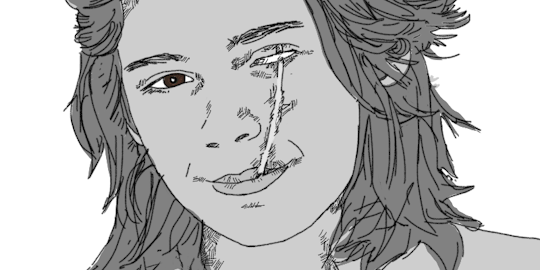

The pitter-patter of rain falling on the tent’s canvas fills Alaric’s ears as he struggles to find sleep. He feels exhausted, but restless at the same time, and the stream of thoughts swirling in his head is not making matters easier. He estimates that there are yet two movements of the stars until dawn. He suspects it will be the last new sun he sees; he is almost certain that he will finally succumb and die due to fatigue during the day’s lesson.
It has been seven days since Archora’s departure from the village. Her position as a hunter trainee had been filled shortly after her disappearance by Alaric’s pit-mate Ainsley, a transition easy for both boys, in Alaric’s estimation.
The day after Archora’s escape Alaric, intent on fulfilling his promise to the fiery girl, met with Ffrewgí before the day’s tasks began. When he conveyed the news, Ffrewgí’s anguished and confused expression told Alaric much about the relationship between the two pit-mates.
Mere breaths after they parted, his thoughts on that subject had been driven out of his mind as training began, throwing Alaric back into the vicious cycle he has grown to so woefully loathe.
A gust of wind drives an aggressive tattoo of rain against the tent as Alaric reflects on his days of training. He has noticed that while he is certainly improving physically through his lessons---in strength, stamina, and technique---he is also becoming alarmingly fragile emotionally and mentally. His panicked episodes have become a frequent part of his life, and Alaric is forced to wonder how far he needs to teeter off the edge of sanity before he finally falls and breaks.
It takes a while longer for sleep to find Alaric, and by the time it does he is lying in a bar of grey-turning-golden predawn light let in by the loose tent flap.
The sun rises, Ainsley and Alaric rise to face it, and the day is exhausting---all indefatigable realities of the boys’ world. Draeg’s decision to pursue peak physical condition for the hunters translates into a strict regimen of running, lifting, throwing, and shooting without break from sunup to sundown.
Hands on his hips, feet bruised and bloody after a midmorning sprint through the tangled forest, Alaric wishes back to when he was left to his own devices on the road. He may have been hungry and alone, but at least he was free to do what he wished. This place---where he is considered, not an individual, not a child, but a captive, subject to the commands of an alien tribe with suspicious intentions---is wholly worse than the wilds, where he was subject only to nature’s elements . . . and the pain of suffering, but that has not been left behind: he wonders how much longer it will be before his mind and body finally collapse under the truth of his unfortunate predicament.
* * *
Drizzling rain and a thin fog surrounds Alaric as he walks back to the encampment after the day’s tasks are done. Instead of heading directly to the dinner clearing, Alaric finds himself wandering through the small captives’ complex. Coming around the back of one of the tents, he nearly walks into a girl, another captive. Her blue-grey eyes catch Alaric’s gaze: somehow, he can sense deep sorrow behind their bright colour.
Framed by long blonde hair that tumbles past her shoulders, those eyes regard Alaric levelly. Even before they speak a word to each other, Alaric feels a grace and gentleness radiating from her like warmth, and his shoulders, tight against the cool, misty air, relax a little.
The girl's smile does not reach her deep eyes. “Hello,” she greets him.
“Hello,” he replies with a measured tone.
“I’m Anwen, what’s your name?”
“Alaric.”
He tries to formulate something to say to fill the silent pause that follows. She turns and walks away before he comes up with anything. Alaric wonders if he had said something wrong, although he had not really said anything. He wonders if his scar had made her uncomfortable, although she had given no indication of it. He watches her curiously as she walks away.
They come across each other again later in the evening, after Alaric has eaten his measly dinner, and if it was not clear before that Anwen is weighed down by some internal struggle, it definitely is now. She walks towards him.
“Hello,” she mutters. A confused sadness clouds her expression. She begins to turn away again, a hesitancy to do so clear in her demeanour.
Alaric searches for something to say, something to stop her from leaving---perhaps an offer to help. He comes up with “How are you doing?” The question carries more weight than Alaric thought it would, and he can see in Anwen’s agonized expression as she turns back around that she is at the precipice of grief and anguish. Her eyes begin to glimmer with growing tears.
“I think my father might be dead,” she whispers. “I never let myself think that before.” Her soft gaze falls to the ground. “He never came home. I watched for him, every day, for two years. Everyone said I was stupid. They said he was dead. But I—I knew they were wrong. They had to be wrong. But now . . . I’m not sure anymore.” The quiver in her voice is like a blade to Alaric’s heart, her pain sharper because of her innocence. “I miss him so much.”
Before he understands what he is doing, Alaric finds himself standing barely a pace away from the girl, trying to offer some form of support by simply standing by her. He is clueless as to what he should do next, but when Anwen looks up, a slightly startled expression on her face, she reaches her arms out in a gesture to hug him and Alaric gladly indulges in her request. He can feel her body contract as she silently cries into his chest.
An odd feeling comes over Alaric as he embraces her: a sudden urge to protect and comfort this girl who reminds him so much of himself when he was left to survive on his own. Alaric feels the need to speak to Anwen, to make sure she is alright. “Are you okay?” he asks quietly.
“Um, I’m feeling a lot better now.” She pulls back to look up at him. “Thank you.”
Alaric forces himself to smile at her, but he knows that suffering is not done with her yet. He wants to do more to help her, but he understands that only time and reflection can truly heal her pain---he realizes he, too, is still waiting for that.
“I—I guess I should go,” stutters Anwen. She looks nervous and slightly conflicted. When Alaric notices a brigand approaching them, he understands why. She gives Alaric a small, melancholic smile before turning away and heading to her tent.
* * *
Days after days of training---rather, servitude, Alaric feels---under the vicious Draeg continue to take their toll on Alaric. His attempts to focus on the positives, on the skills he has gained, grow weaker and weaker, and he fears his decline has begun to affect his relationships with his training partners---Cydwag, but especially Ainsley.
As the days grow colder and darker, so does Alaric. His frustrations flare during even the simplest of exercises and he becomes increasingly restless during the nights, feeling as though he should be doing something to get out of his predicament. He considers following Archora, risking everything to escape, but the facts remain: he has nowhere to go and certainly nobody to go to. That, and, he has trouble admitting to himself, his consideration for Anwen holds him here. He would not abandon her here; he has shown her that he will be here for her in her times of need. He decides to stay . . . to stay and struggle.
After a particularly stressful day, Alaric finds himself skipping dinner, heading straight for the captives’ complex and sitting by an edge of it that affords a view through the brigands’ village to the woods beyond. He sits, quietly contemplating everything around him: the sounds, sights, and smells. He tries hard to calm the conflict waging inside himself, between his emotions, rising now in crisis, and his old rationality. He feels his true desires balance on the edge of a precipice. He is in deep contemplation when a questioning voice calls out from behind him.
Alaric turns towards the voice with aggression on his face and irritation in his eyes---an expression that dissolves immediately when he sees Anwen, regarding him kindly.
“Sure,” he responds quietly, picking out from his clouded thoughts her inquiry to join him.
She takes a seat beside him, sharing his view of roiling fog, the forest a bowshot away now masked in cryptic grey. She shares his silence, too, staring wordlessly at the natural oblivion as it stares right back.
“Are you okay?” she asks after a while. “You don’t have to talk about it, if you don’t want to,” she adds quickly.
Alaric smirks. The idea of sharing the story of his own dark and painful past with a girl already suffering from her own does not seem like the best of ideas to Alaric. “I’m fine. Just thinking about some things.” He turns back to her, genuinely curious, asking, “How are you holding up?”
She does not immediately respond to his question. Alaric wonders if he had said something wrong. Then she shifts her position, her blue eyes fixed on the fog beyond, and speaks.
“I had a dream about my father. There was a great storm and a ship was caught on the rocks.” She momentarily glances at Alaric while explaining. “That happened sometimes---the coastline around my village is very treacherous. There were people trapped on the shipwreck and my father was sailing his boat, out in the storm, trying to save them.” She gives a soft smile, and her eyes become absent as if they are viewing a separate scene entirely. “He would do that, too. He sailed in storms, and at night, and out of sight of land. No one else would do that. They said he was reckless---” she loses her smile---“that he would get himself killed one day.” She takes a breath, as if she is reliving the memories all at once. “I dreamed there was a wave, a giant wave, bearing down on him, but he didn’t see the danger. That’s what made the dream so awful. It was like I was really there, but I couldn’t warn him. That’s when I woke up. I’ve been thinking about it a lot since then. That’s when I started to wonder if---maybe---he is dead.” Another deep breath. “But, you know, he was never afraid. Even in my dream he wasn’t afraid. His eyes were shining, just like they did when he would tell us about his latest adventure, before my mother would scold him. I think, even if he knew about the wave, he still wouldn’t have been afraid. Even if he knew he was going to die, he wouldn’t have been afraid. And he still would have tried to save those people. I want to be like him.” She fixes her eyes on Alaric’s.
He holds her gaze, ready to destroy all the doubt and grief placed in her mind by the people who were supposed to have comforted her. He can feel anger rising in his chest. “Your father must’ve been an incredibly brave man, like one of the heroes in the stories. Anwen, no matter what others say---they don’t know what really happened to him, and neither do we. He could very well be settled far off on the shores of a different land entirely, getting ready to sail back and take you with him.”
Anwen smiles at Alaric, a genuine and true smile.
“But either way,” Alaric continues, “he would be proud of you, Anwen. You’re strong and kind, and you haven’t let your pain or fear hold you back. It takes an extraordinary person to manage that. He wouldn’t want you to be afraid, either. He would want you to keep going, and not to look back. What those people said, about him being reckless and about how he would get himself killed---well, what do they know? What great things have they ever done in their lives? I bet they all secretly wished they could sail on the sea like your father did.” Alaric nods reassuringly to Anwen, making sure she believes in his words just as he does. He places a consoling hand on her shoulder before looking back out into the fog.
“Thanks,” she says, then, after a quiet moment, “This is nice. It’s kind of like we could be anywhere. If you weren’t here, where would you rather be?”
The question has Alaric genuinely stumped. He cannot think of any one place, can only think of the open road, the expansive forests, and the free-flowing rivers that have been his home for the last few years. He hesitates. “I . . . I don’t really know. What about you?”
Anwen considers the question herself. “I guess I’d rather be home. It’s strange—while I do miss home, there are also things about it that I really don’t miss. And if I was there, I would miss the people I’ve come to know here.”
Alaric appreciates the honesty of her reply. He begins to think of his own home, and is startled to realize that he can barely remember anything past the last, horrible night he had spent there. He searches his mind for more, but nothing surfaces. Suddenly, he is speaking about that night; before he realizes it, his memories are spilling out and he has no control over the words falling out his mouth---or the painful emotions tied to each one of them. He is saying, “About two years ago, my mother and father were killed by bandits who had raided our cottage in the middle of the night. I was hiding under my bed when I saw them both fall to the floor, barely a pace away from me. I wanted to scream, but I couldn’t even breathe.” Alaric forces his eyes onto the ground, not daring to look at Anwen’s face as he puts himself at the most vulnerable he has ever been. “My instincts told me to run, and so I did. It was a bad decision.” Alaric scoffs, remembering the decision he had made that would come to literally and figuratively scar him to this day. “Before I could even make it out the door, one of them caught me by my arm. I was in a frenzy, and he couldn’t get a good grip on me, so just as I got loose, he began slashing his knife at me. And boy, did he get me good,” he sighs as he gestures to his scar. “When I did get away, I ran faster than I ever have in my entire life, and I didn’t look back, not even once . . . I’ve been on the road for two years, just running away from it all, and it still isn’t enough. I think I might be losing my mind. At times, I---”
Alaric stops speaking when he feels Anwen tense beside him. Pulled from his thoughts, Alaric sees a brigand walking towards them.
“What are you doing?” the man barks. “You are supposed to be in your tents!”
Alaric barely registers the man’s words as his mind floods again with his thoughts. He is on the brink, his secrets spilled---all control threatens to leave him. Anwen stands suddenly, presumably at the brigand’s command or out of sheer terror, and Alaric follows suit, fighting his mind.
“I—I didn’t know it was so late,” Anwen explains.
Alaric’s face remains turned down. His jaw flexes and blood thrums in his temples.
The brigand sighs irritably. “Go on. You’re not in trouble, but you should be in your tents.”
Alaric silently thanks the man for his leniency and immediately takes the chance to escape the situation. He walks straight towards his tent, not looking back to Anwen, wishing he had never placed his turmoil upon her shoulders.
He lays down as soon as he is inside his tent, drained of all energy and overcome by exhaustion. He suddenly regrets not saying goodbye to Anwen, and curses himself for breaking the silence he kept regarding his past. Yet, for the first time in weeks, Alaric finally manages to find sleep, however fitful and full of nightmares it is.
0 notes
Text
The Treatment Of ‘White Coats’
The Treatment Of 'White Coats' 14ymedio, Pedro Campos, Miami, 11 April 2017 – The treatment of blacks and the market in slaves brought from Africa developed by the European colonists has clearly been established as a crime against humanity before all contemporary civilized beings without the slightest doubt. It was a practice that "sold" human beings as if they were merchandise to serve as mere instruments of production, especially in the sugar, coffee and cotton plantations of the New World. In the twentieth and twenty-first centuries human trafficking acquired other connotations that made the United Nations address the issue as an international crime because it has continued — albeit in ways different from that slavery, but essentially with the same connotation — to subject people to the exploitation of prostitution or other forms of sexual exploitation, forced labor, slavery and practices similar to slavery, servitude and the removal of organs. The victims have been mainly women and children. Right now, Maria Grazia Giammarinaro, United Nations Special Rapporteur on human trafficking is visiting Cuba. In order for the distinguished visitor to know an issue that she should investigate in Cuba, I present the case of the "white coats," which in one way or another many in Cuba have denounced for years. In this regard, it is necessary to refer to the UN definition of human trafficking. The UN Protocol Against Human Trafficking refers to it as "the recruitment, transportation, transfer, harboring or receipt of persons, by means of the threat or use of force or other forms of coercion, of abduction, of fraud, of deception, of the abuse of power or of a position of vulnerability or of the giving or receiving of payments or benefits to achieve the consent of a person having control over another person, for the purpose of exploitation." After reading this definition, does anyone have any doubts that the operations of the Cuban Government in sending Cuban doctors and paramedics to different countries of the world to "fulfill internationalist missions" constitutes real trafficking in persons for the purpose of exploitation? The Cuban Government captures, transports, and transfers Cuban doctors and paramedics using the abuse of power it has over its citizens and especially the situation of economic vulnerability of those workers. They are given certain small benefits, in a situation where the low level of wages established by the Government itself for its employees, allows it to obtain the consent of these employees to be exploited. At the same time, it appropriates between 70% and 90% of the wages paid by the governments of other countries, or by health institutions of the World Health Organization (WHO) itself, for the services of these professionals. Medicine is one of the fields of those in which the Cuban state forbids self-employment, which is another factor in the pressure to force professionals to "accept" internationalist missions. If self-employment were allowed their incomes would increase and they would not have to be forced to "serve on a mission." In addition, these professionals are prevented from taking their families with them, but rather are forced to leave their children and spouses as hostages that force them to return to the country, for which they are also victims of extra-economic coercion. The deception has also been used to obtain the recruitment of Cuban doctors for these purposes, since they have been offered perks that were never satisfied, such as the chance to buy a car. To give an idea of the magnitude of this program of the Cuban government, according to its own Minister of Public Health, Roberto Morales, Cuba has about 50,000 professionals working in more than 66 countries. According to Granma, the official newspaper of the Communist Party, the government receives about eight billion dollars a year for this slave labor. It is the largest sum of foreign currency entering the country, only comparable to that which comes from Cuban-Americans abroad, who send remittances to their families on the island, along with food, medicines, clothes and appliances, along with travel expenses for themselves and their families. These elements are sufficient to accuse the Cuban Government of operating a huge international system of trafficking in white coats on several continents that includes flagrant and massive violations of the human rights of these citizens: the reality of the Cuban economy forces them to serve as slaves to the Cuban state, and be subjected to the situation of leaving their relatives behind as hostages. The most recent example that proves this is a major government business is the recent decision to prevent physicians from leaving the country freely like the rest of the citizens, unless they do so through such "internationalist missions." If United Nations rapporteur wishes to have complete information on this matter, in addition to hearing what the Cuban Government has to say about this, she should meet with some of the hundreds of doctors who have decided to abandon their missions and reside in the US or other countries. Cuban human rights organizations, opposition groups and dissidents will surely try to ensure that this issue is duly investigated by the honorable Special Rapporteur of the UN for trafficking in persons, on the occasion of her trip to Cuba. Source: The Treatment Of 'White Coats' – Translating Cuba - http://ift.tt/2oFQ0Oi via Blogger http://ift.tt/2oiN9Kn
0 notes